Foundation NZ
ANNUAL REPORT 2025



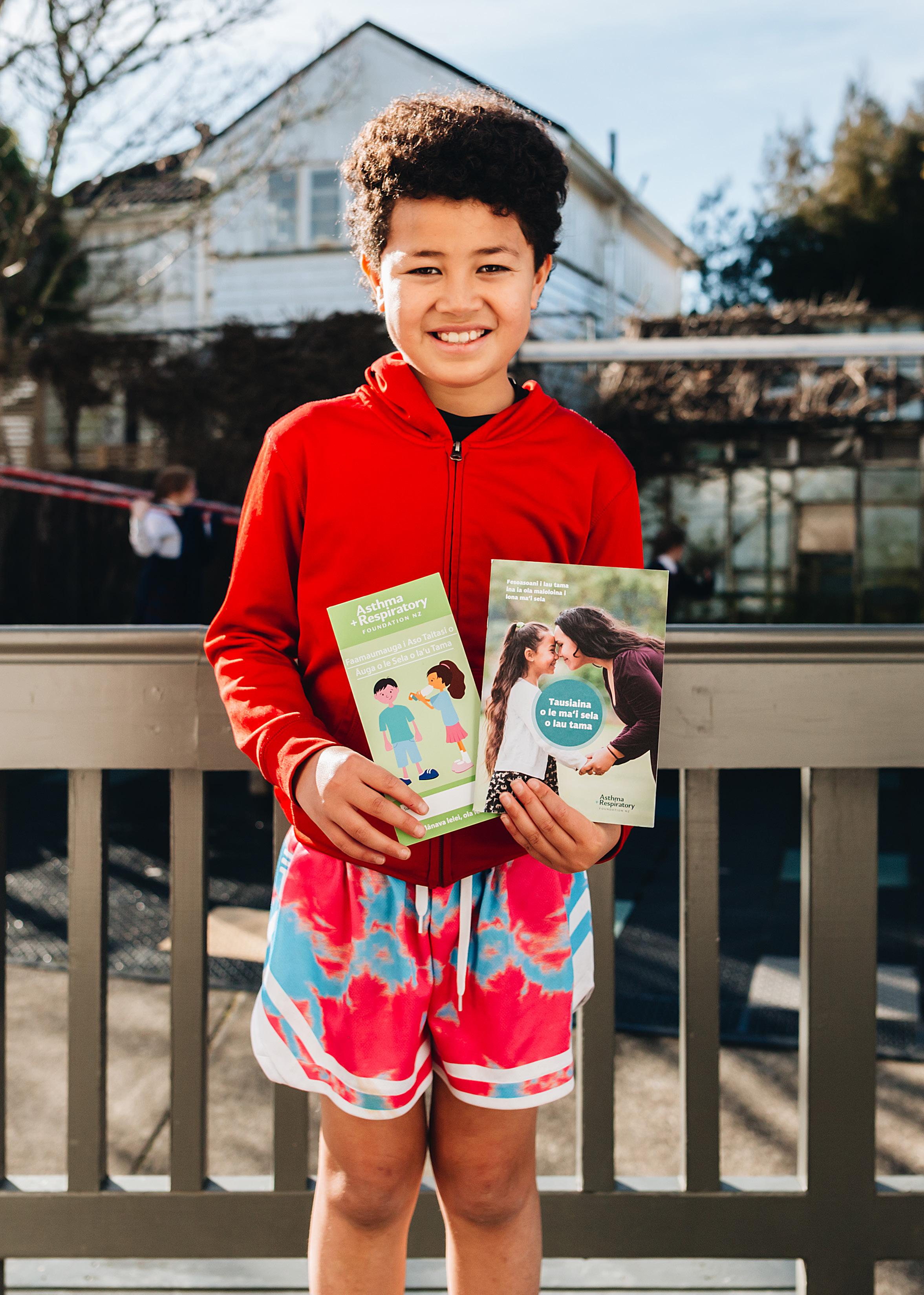
The Asthma and Respiratory Foundation NZ (ARFNZ) is New Zealand’s principle authority for all respiratory conditions, representing the interests of the 1 million New Zealanders living with a respiratory disease.
Respiratory disease in New Zealand


leading cause of death

3rd annual cost to NZ $8 billion
82,500

hospital admissions

26,300 hospital stays attributed 1 in 11
children hospitalised annually

1 million people live with a respiratory disease in NZ
That’s 1 in 5 New Zealanders
Our vision
To be the trusted and independent leaders in respiratory health knowledge to improve respiratory health outcomes for all.
Our mission
Develop and support respiratory health best practice through partnering, research, training and education.
Our goal
To reduce hospitalisations for respiratory conditions.

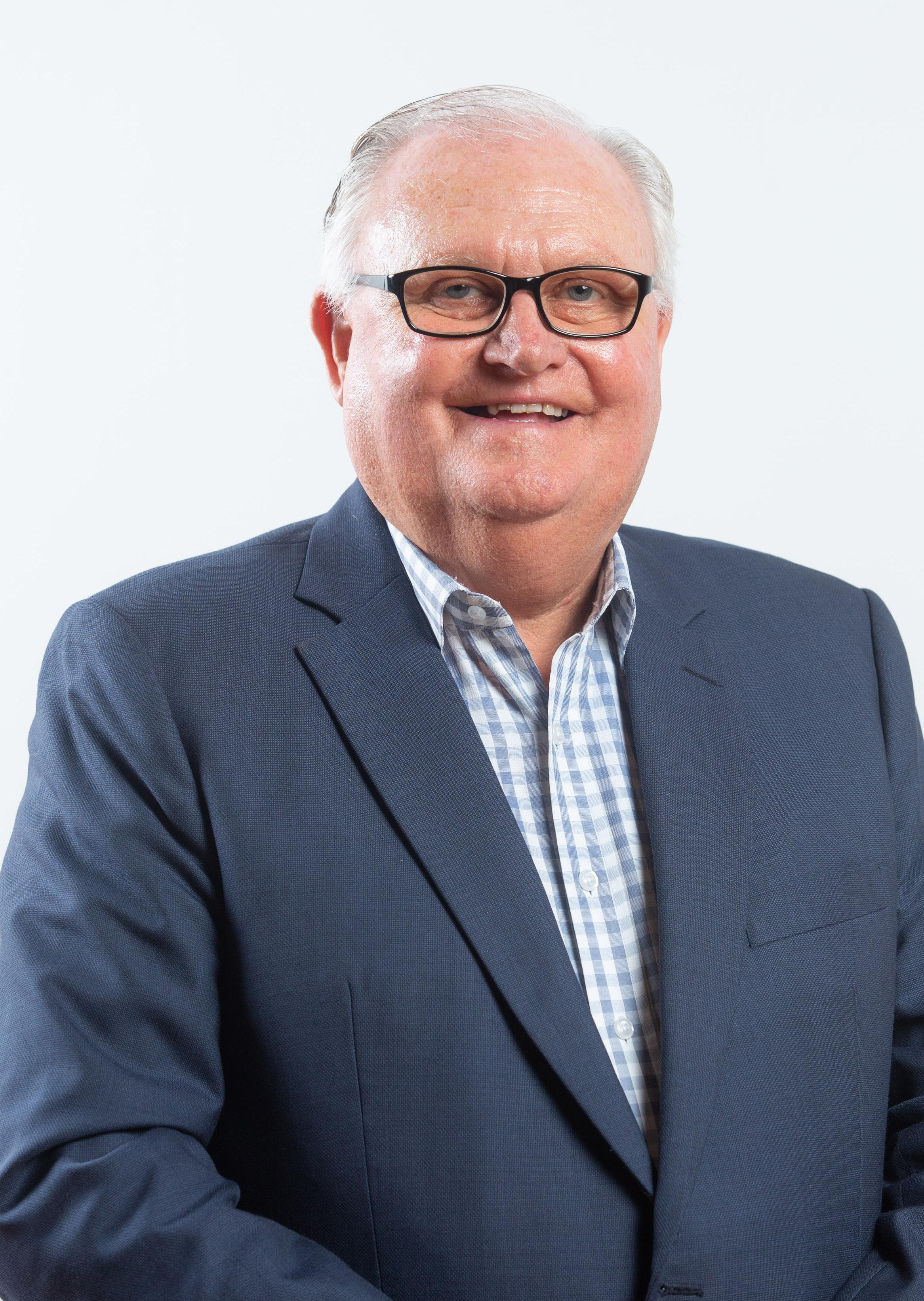
President’s report
On behalf of our trustees, it is my pleasure to report on the achievements and successes of the past year for the Asthma and Respiratory Foundation NZ.
As the national body advocating for people living with asthma, chronic obstructive pulmonary disease (COPD), and respiratory conditions across New Zealand, the Foundation plays a critical role in providing trusted best practice national guidelines and resources to health professionals, ensuring better patient health outcomes nationwide.
The Board continues to strongly support advocacy on reducing vaping use in New Zealand. Through our educators, we are reaching out to schools and communities to highlight the impact vaping has on the health of young people.
I would like to acknowledge the invaluable work of our Scientific Advisory Board, whose sound, evidence-based clinical advice guides the work of our staff and Board. In particular, their work in updating the NZ COPD Guidelines has been greatly appreciated – these will be of enormous benefit to the hundreds of thousands of New Zealanders living with COPD.
On behalf of the Board, I extend my heartfelt thanks to our CEO, Letitia Harding, for her outstanding leadership of our dedicated and hardworking team. Letitia is a strategic thinker who brings forward initiatives to grow our organisation and expand our reach. Her leadership has also been central in guiding our sister organisation, the Kia Manawanui Trust – The Heart of Aotearoa, which is advancing advocacy for improved heart care. Letitia’s exceptional communication skills and media presence continue to make her an inspiring face of both organisations.
I also wish to sincerely thank our corporate sponsors through the Friends of the Foundation. Your partnership enables us to deliver vital programmes that improve respiratory health for all New Zealanders. To our loyal donors, including those who contribute through regular giving and bequests, we are deeply grateful. As our
organisation receives no government funding, we rely heavily on the generosity of grant providers, families, and individuals. Quite simply, we could not achieve our successes without your support.
During the past year, Paul Larson resigned from our Board. I wish to thank Paul for the wisdom and insight he brought to our discussions. To my fellow trustees, thank you for your commitment, your diverse perspectives, and your thoughtful guidance, which strengthen our strategic thinking and support the mission of our organisations.
I also acknowledge Sir John Clarke, our Chief Cultural Advisor, for his wisdom and insight in helping us deepen our commitment to Te Ao Māori.
Finally, I extend my sincere gratitude to all our supporters, stakeholders, and partners. Together, we are striving to achieve better respiratory and cardiac health for all New Zealanders, and we look forward with optimism as we continue this important journey.
Ngā mihi,

John G. Knight President
Chief Executive’s report
Kia ora e te whānau, I can’t believe it is almost the end of the year (again!). This year seems to have flown by, so it’s a perfect time for us to stop, pause, and reflect on everything we’ve achieved over the past 12 months. It’s also a chance to introduce some new faces to the Foundation team, which you can find on page 22.
The Foundation is the ‘trusted and independent leader in respiratory health knowledge,’ and we value and honour this position to improve respiratory health outcomes for all New Zealanders.
As we all know, there is a lot of uncertainty in the healthcare sector, and people are very time-poor, so a key goal of the Foundation is to make life a little easier for healthcare professionals and patients by providing reputable information. We do this not only by offering evidence-based resources, but also by raising awareness through our well-established media channels (you can see our stats on page 18).
I would like to thank Chloe Bradwell, our PR and Communications Manager, for the excellent work she does in this area. I can’t count how many times we have had 5am starts and weekend calls that require so much time, preparation, and dedication, often with very little notice. So, thank you for this mahi, Chloe.
A couple of major news items for the Foundation this year were the biennial Respiratory Impact Report and the 2024 Vaping in Youth Survey. The Impact Report helps us gauge how well we are performing across six respiratory indicators, including asthma, COPD, and bronchiectasis. It highlights the regions doing well and those needing more help to address inequities and improve respiratory health outcomes for all. You can find more details about the report on page 14.
In November 2024, the Foundation released its second national Youth Vaping in New Zealand Survey, which showed that, overall, youth vaping rates had dropped, which is great news. It was also the first survey in New Zealand to look at the prevalence of vaping in younger students,
some as young as 10 years old. The report showed that tighter regulations – advocated for by the Foundation since 2017 – and on-the-ground education (such as the Foundation’s vaping education workshops) were having a positive impact. The not-so-good news is that we have senior students (Years 12 and 13) who now have the highest vape use. These are the students who fell through the cracks when we had few regulations in place. You can read more about the survey on page 16.
As a result of that survey, the Foundation decided we had to once again evolve and pivot with our youth vaping education efforts. Which is why this year we launched New Zealand’s first Train the Trainer vaping education certification programme. This programme is dedicated to youth vaping education, equipping educators, health professionals, and community leaders with the tools to inform and empower rangatahi and young people in their community. To date, most participating organisations are kaupapa Māori or Māori-centred. The response from kaimahi Māori has been overwhelmingly positive, with many expressing that this type of training has been needed for a long time. The role is now firmly positioned in community settings where it can provide the greatest impact, supporting local leadership and system change, and we look forward to this valuable mahi spreading throughout the country. You can find more information about the programme on page 10.
All of the scientific component of the Foundation’s work is reviewed by our esteemed Scientific Advisory Board (SAB), chaired by our Medical Director (MD), Professor Bob Hancox. We would like to thank Bob for his leadership in this role, as his expertise is crucial and ensures that all the information released by the Foundation is evidencebased. It is also important to note that our SAB are all very busy health practitioners and researchers who volunteer their time. I know that Joanna Turner, who is the Foundation’s Education and Development Manager, spends a lot of time working closely with our MD and SAB on all our educational resources, so thank you, Joanna, for the many hours you put in.
It goes without saying (but I will) that all our staff, both past and present, are the lifeblood of the Foundation, and I am so proud to work alongside such a dedicated and talented team. The Foundation team are made up of skilled, passionate, and committed people who all share the same vision to improve the respiratory health of Aotearoa. See our team on page 22.
Being a Chief Executive also means working closely with a Board, and I am so fortunate to have such a skilled and experienced Board from a vast array of health and commercial backgrounds. Over this past year, we have had some changes, and I would like to thank Paul Larson for his time on the Board. Paul stepped down earlier this year due to other commitments. You can read more about who our Board members are on page 20.
I would also like to take this opportunity to thank our Chair, John Knight. John is always there to assist in guiding my leadership, and I always value his sage advice and perspective. John and the Board truly are the mountains that the Foundation stands on, so our voice can be heard, loud and clear, and to as many people as possible.
Acknowledging our Board wouldn’t be complete without mention of our Chief Cultural Advisor, Sir John Clarke. His wisdom, knowledge of Māori tikanga, and his guidance steers our waka, for which we are truly grateful. Sir John and Lady Clarke give their time so freely to attend and present at events like the upcoming New Zealand Respiratory Conference.
Partnering with organisations and groups that really understand their communities is also important to the Foundation. So I am pleased to say that our corporate sponsorship programme, Friends of the Foundation, goes from strength to strength, enabling us to form valuable and productive partnerships with businesses that, like us, want to improve respiratory health for all New Zealanders. You can see who our wonderful sponsors are on page 13.
One last big change for us this year, or rather addition, was the launch of the Kia Manawanui Trust – The Heart of Aotearoa. It is a sister charity to the Foundation, which launched in October 2024 to advocate for improved heart care in Aotearoa.
The Trust addresses issues in cardiac health, including long wait times, staff and bed shortages, and the need for faster diagnostics and treatment, with the aim of improving equity and outcomes for New Zealanders with cardiovascular disease. Heart and lungs are so closely aligned, it made sense to step into this space, and you can read more about our sister charity on page 15.
Lastly, as you all know, the Foundation receives no government funding, so at this time it is always a pleasure to thank our donor family, our grant providers, and the individuals and their families who have generously left bequests to the Foundation. We simply could not do all that we do without you.
Ngā manaakitanga,

Letitia Harding Chief Executive

Letitia Harding, Chief Executive
Māori engagement
We are committed to supporting Māori-led solutions that improve respiratory health outcomes. This year, we focused on the urgent challenge of youth vaping, equipping kaupapa Māori organisations and community leaders with resources and training to protect rangatahi.
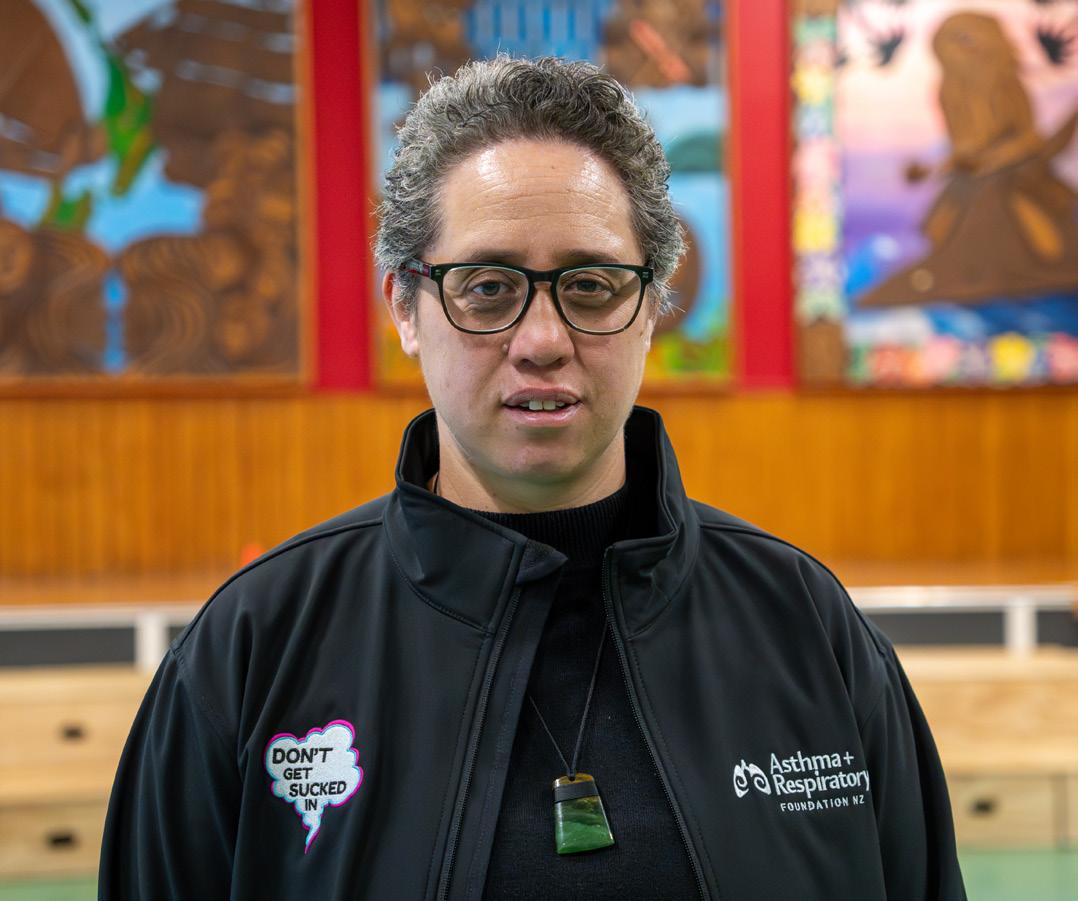
“When I sit with whānau and hear their concerns about rangatahi and vaping, I’m reminded that this mahi is about more than education –it’s about protecting futures.”
Sharon Pihema, Āpiha Takawaenga Māori (Māori Community Liaison)
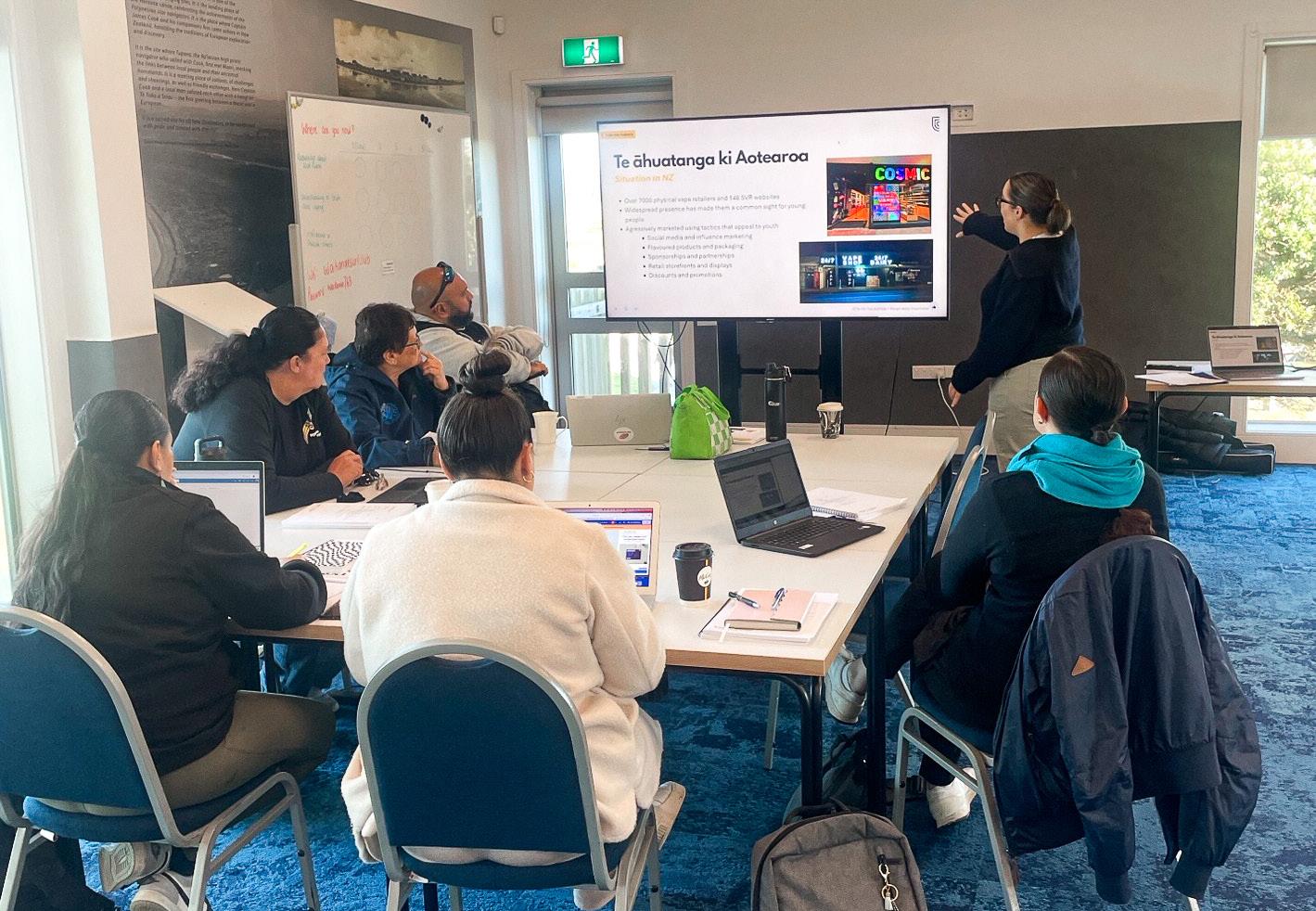
Āpiha Takawaenga Māori (Māori Community Liaison)
Over the past 12 months, our Āpiha Takawaenga Māori continued to strengthen relationships with Māori communities both in Tairāwhiti and across Aotearoa. The role has evolved from working mainly in schools to one focused on advocacy, leadership, and facilitation, supporting kaimahi, kura, and kaupapa Māori organisations with relevant information, resources, and support to address youth vaping.
New relationships were formed through the delivery of the Foundation’s Train the Trainer programme – New Zealand’s first programme dedicated to youth vaping education, equipping educators, health professionals, and community leaders with the tools to inform and empower rangatahi and young people.
Most participating organisations, to date, have been kaupapa Māori or Māori-centred. The response from kaimahi Māori has been overwhelmingly positive, with many expressing that this type of training has been needed for a long time. The role is now firmly positioned in community settings where it can provide the greatest impact, supporting local leadership and system change.
The Āpiha Takawaenga Māori is seen as a trusted source of knowledge on youth vaping at both school and community levels. They share up-todate research, provide insights into our local and national mahi, and act as a key point of contact for services working with rangatahi.
Improving clinical best practice
As the national leader in respiratory health, the Foundation develops, updates, and promotes best practice standards for the diagnosis and treatment of asthma and COPD. This ensures health professionals have access to the latest evidence-based care –a responsibility we advanced this year through guideline reviews, a national Think Tank, and record uptake of our online training.
Online eLearning Fundamentals
There was a 255% increase in the number of enrolments in the Asthma and COPD Fundamentals eLearning course this financial year. The significant increase is due, in part, to receiving a grant to enrol a group of health practitioners, as well as interest from various PHOs wanting to upskill their nurses.
Spirometry Think Tank
In October 2024, the Foundation hosted a two-day Spirometry Think Tank with 26 health professionals from across New Zealand. The group examined barriers to access, training, and device integration, and shared examples of current practice. A briefing paper outlining potential solutions was submitted to both the former Minister of Health, Shane Reti, and the current Minister, Simeon Brown.

348 enrolments in the Fundamentals eLearning course
Guideline updates
Over the past year, two guidelines have been reviewed. Firstly, the Foundation’s Scientific Advisory Board and the 2020 guideline authors reviewed the NZ Adolescent and Adult Asthma Guidelines 2020 against the latest Global Initiative for Asthma (GINA) report and other international guidelines. They confirmed the guidelines remain up-to-date and fit-for-purpose, recommending only minor changes and extending their expiry to 2027. Secondly, a multidisciplinary working group of 17 authors has also been updating the NZ COPD Guidelines 2021 (due to expire this year). Once completed, the revised COPD guidelines will be submitted to the New Zealand Medical Journal for publication.
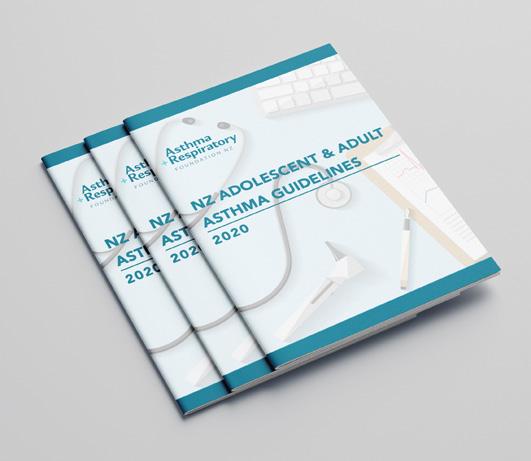
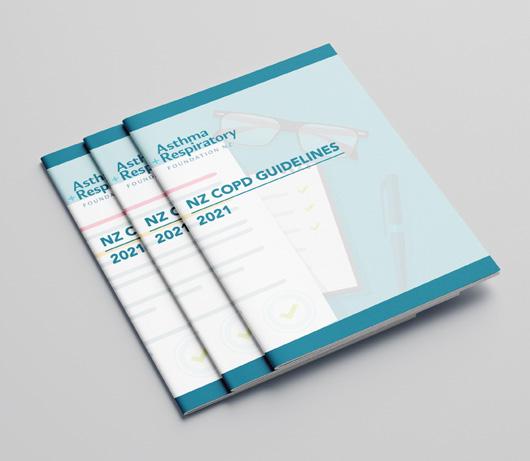
12,164 guidelines distributed (digital and print)

Improving self-management
Our goal is to ensure that everyone living with asthma has the tools and knowledge to manage their condition. Through providing free action plans, educating children through Sailor the Pufferfish in both te reo Māori and English, and sharing resources with schools and teachers, we are strengthening understanding of respiratory health across Aotearoa.
New patient resource: Bronchiectasis Fact Sheet
Completed ahead of World Bronchiectasis Day on July 1, 2025, this new downloadable Bronchiectasis Fact Sheet explains what bronchiectasis is, the causes, risk factors, symptoms, and how it is diagnosed and treated.
Sailor the Pufferfish
In the 2024-25 financial year, Sailor the Pufferfish

total downloads since May 2024

32,083 total action plans distributed (asthma, COPD, and bronchiectasis)
5 languages represented
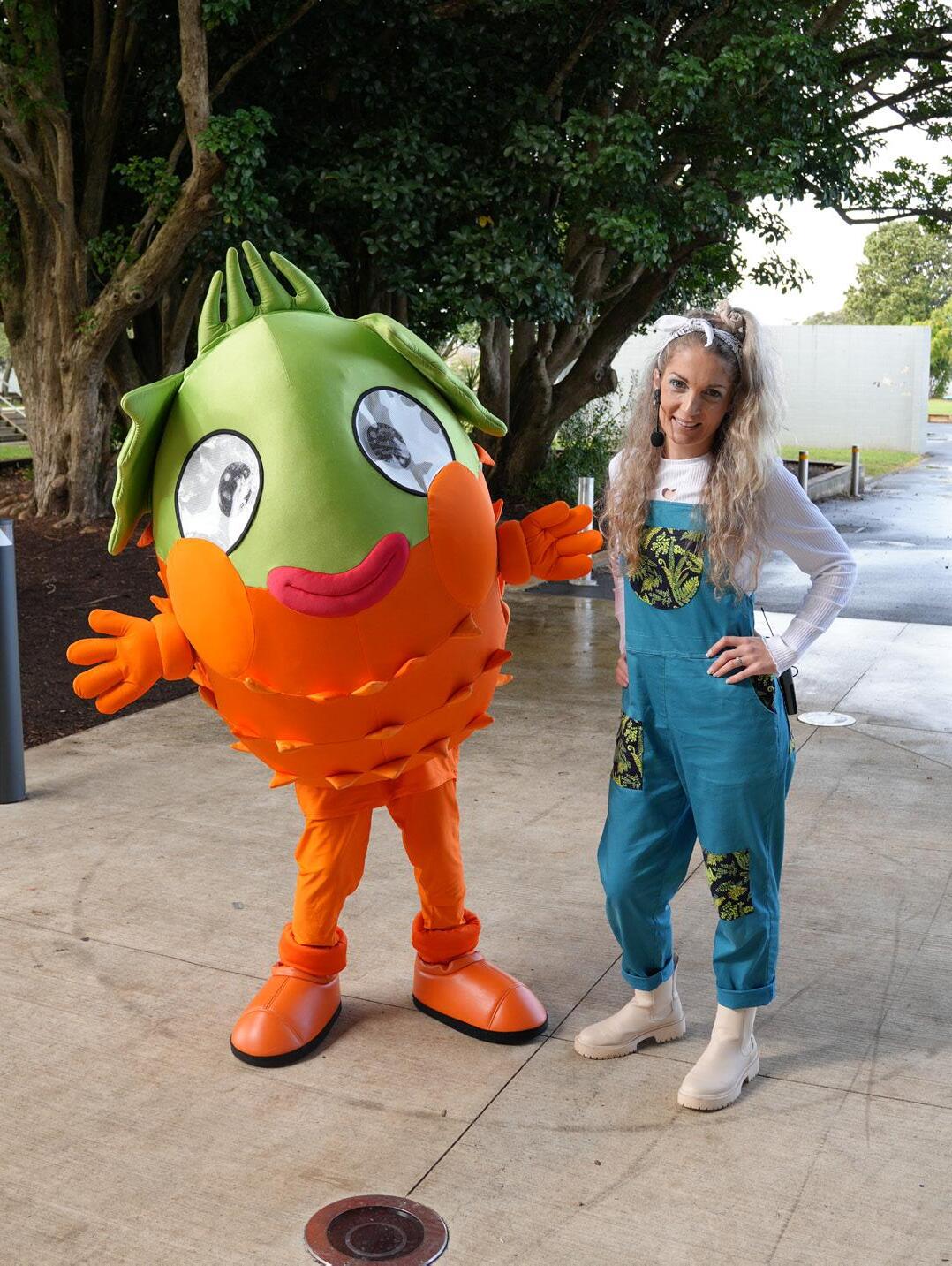
Security and stability
The Foundation continues to pursue and create multiple income streams to support our work. We also rely on our dedicated donor community and supporters to continue to provide generous contributions that underpin our vital work.
Grant applications
The Foundation continues to operate without government funding and remains heavily reliant on the generosity of philanthropic individuals, corporates, and grant funders to sustain our core work.
The Foundation received a total of $422,092 in grants over the last financial year.
Friends of the Foundation
Friends of the Foundation is a business sponsorship programme that supports the activity of the Foundation. We form partnerships with likeminded businesses who want to help improve the respiratory health of all New Zealanders. Over the past 12 months, our sponsorship portfolio has changed due to challenging economic times –losing four partners who have cut their sponsorship budgets, including Warmer Kiwi Homes, Dyson, Daikin and Pulse. However, we signed a new partner, AHI-Carrier Toshiba, and have a total of seven sponsors as of June 30, 2025.
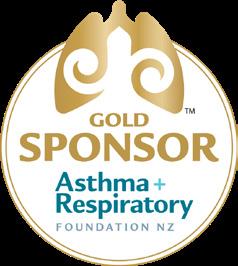
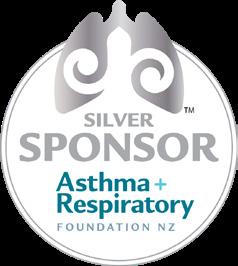
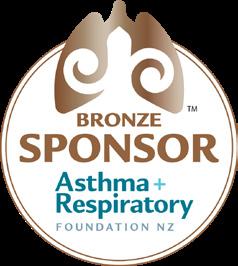

$422,092 received in grant funding
$35,218 raised through fundraising campaigns
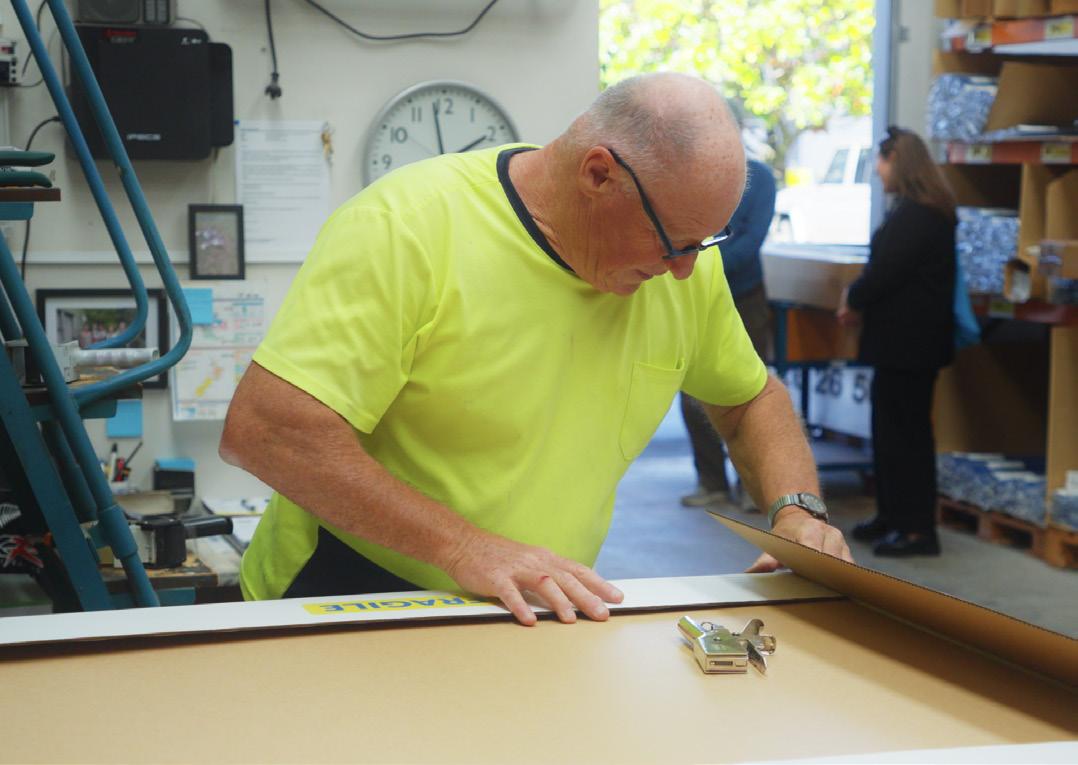


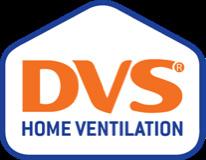


$95,000 raised through Friends of the Foundation
Leaders in respiratory health
The Foundation is recognised as a national leader in respiratory health, driving change through evidence-based research, education, and advocacy. The release of the 2023 Impact of Respiratory Disease in New Zealand report reinforced this role, providing the latest statistics on the scale of respiratory illness and highlighting areas where progress is being made.
2023 Impact of Respiratory Disease in New Zealand Report
The Foundation released the 2023 Impact of Respiratory Disease in New Zealand report in September 2024, which revealed 1 in 5 Kiwis are affected by a respiratory illness. The previous report, released in 2021, found that figure was 1 in 7 (or 700,000).
Releasing these statistics positioned the Foundation, again, as leaders in the respiratory space through evidence-based research.
Despite the grim statistics in the report, New Zealand has made some progress.
Hospitalisations from asthma and COPD have already exceeded the Foundation’s target of a 25% reduction by 2025, due to improvements in prevention and care of these conditions that the Foundation has been advocating for for years.
Since its release, the key statistics webpage has been viewed 6240 times and the full report has been downloaded 899 times.
Key statistics from the 2023 Impact of Respiratory Disease in New Zealand Report.
Our sister charity
Launched in October 2024, Kia Manawanui Trust is the sister charity to the Asthma and Respiratory Foundation NZ, with a vision to address inequities in cardiac health. By championing patient voices, supporting health professionals, and raising awareness of issues in the heart healthcare system, the Trust is committed to improving access, equity, and outcomes for people living with cardiovascular disease in New Zealand.
Mobile ECG campaign
In late 2024, the Trust launched a campaign to get as many portable ECG devices into underserved communities across Aotearoa. For every $350 raised, a GP practice or community-based specialist nurse received a KardiaMobile 6-Lead ECG, a portable device that can identify atrial fibrillation (AF) in approximately 30 seconds. AF is a serious heart condition that can lead to stroke and heart failure if undiagnosed. It affects 1 in 35 Kiwis aged between 35 and 74. The campaign was met with encouraging interest and engagement, which translated into generous donations. As at June 30, 2025, the Trust raised $8495 and delivered 20 devices to eight primary healthcare facilities in communities in need.
Media coverage
The Trust began engaging with media in late 2024 to raise awareness and increase knowledge of the Trust and its mission. Since sending the first media release in October, the Trust has sent a further two. These releases, as well as direct contact with reporters, led to 25 media mentions across radio, print, TV, and online.
Social media
The Trust launched its social media channels in late 2024 as a way of distributing the Trust’s content, news, and promoting awareness campaigns. Over the last financial year, our social channels grew from 0 to 480 followers across Facebook, Instagram and LinkedIn. The Trust is also exploring hosting a TikTok account.
Website
The Trust launched its website in September 2024. It provides information about the Trust’s mission, its ECG campaign, news and updates, donation opportunities, and a platform for sharing personal experiences in cardiac healthcare. Since the launch, it has attracted a steady flow of visitors, reaching the site directly or via Facebook, with engagement indicating strong interest in our mission and advocacy.
10,224 website views Sept 2024 – June 2025
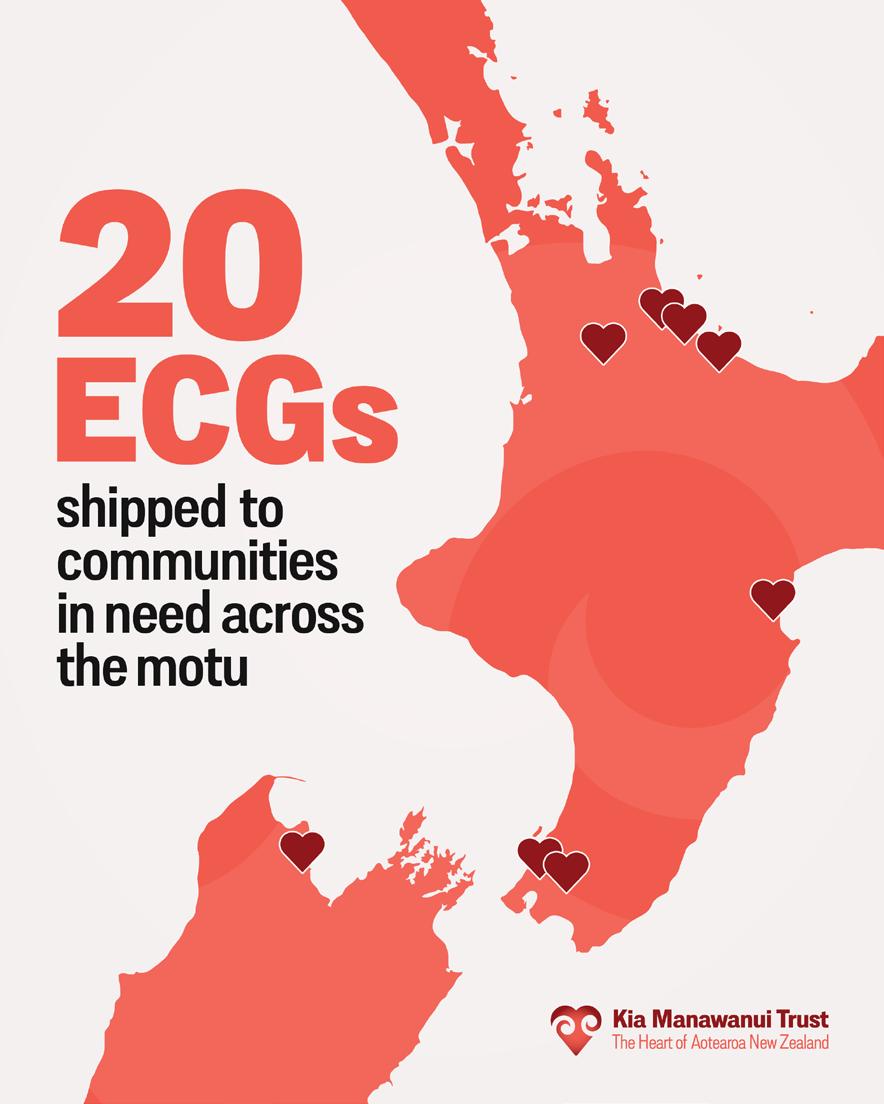
Social media post on the Kia Manawanui Trust channels showing the number of ECGs that have been delivered, so far, to communities in need.
Vaping education and advocacy
Youth vaping remains one of the most pressing health and social issues in Aotearoa. The Foundation continues to lead the national response through evidence-based advocacy for stronger regulation, while also delivering practical education in schools and communities. From large-scale surveys to grassroots workshops and the launch of our Train-the-Trainer programme, our work is helping to shift knowledge, confidence, and behaviours around vaping.
2024 ARFNZ/SPANZ/ NZAIMS Vaping in New Zealand Youth Survey
In November 2024, the Foundation released its second national ARFNZ/SPANZ/NZAIMS Vaping in New Zealand Youth Survey, which showed that – overall – youth vaping rates had dropped. It was the first survey in New Zealand to look at the prevalence of vaping across both intermediate and secondary schools, including students as young as 10 years old. It showed that tighter regulations (advocated for by the Foundation) and on-theground education (such as the Foundation’s vaping education workshops) were having a positive impact.
Since its release, the vaping survey webpage has been viewed 606 times and the full survey has been downloaded 133 times.
vaping survey webpage views
Vaping in New Zealand Youth survey 2024 - key findings asthmafoundation.org.nz
•With
to include students from Year 7 to 13.
•Overall, there has been a substantial reduction in vaping in Years 9-13 with 12.2% reporting vaping in the last seven days, compared to 26.6% in our 2021 survey
•More students had given up vaping than starting vaping in the past year This was the case in every year except Year 13.
•Vaping is most frequent in the Year 12 – 13 group, with 21.9% having vaped in the last seven days
• 3.7% of Year 7s, and 26% of Year 13s had vaped in the last seven days.
•Many students reported waking in the middle of the night to vape.
•Of those who reported knowing the nicotine concentration of their vape, the majority were vaping at high (18-24mg) to very high (24-50mg) doses.
• The most common source of supply was from friends (70%), however almost a quarter (24.6%) still obtained them directly from retailers (vape stores, dairies and service stations).
• Of those students who had vaped in the last seven days, 47% reported they felt addicted to vaping and 48% reported it was having a negative effect on their health. Weekly vaping is nearly twice as high among Māori students than NZ European students.
• 10.7% of total respondents had vaped and 3% had smoked a traditional cigarette in the last seven days.
• Of the 1173 students who reported vaping in the last seven days, 23% were vaping daily and 42% reported vaping several times a day.
• Unfortunately, vaping rates have increased among older students, with 19.7% of Year 12s and 26.1% of Year 13s having vaped in the last seven days, compared to 16.8% and 12.6%, respectively, in 2021.
What needs to change?
WE RECOMMEND:
“It’s promising to see a significant reduction in youth vaping rates, which highlights the positive impact our vaping education workshops have on students and in communities. While there is progress, the findings also remind us of the continued challenges, particularly with older students who are vaping more often.”
LETITIA HARDING CHIEF EXECUTIVE
“The decline in overall vaping rates is encouraging, but the increasing rates among older students are very concerning, with many students vaping high doses of nicotine and reporting symptoms of addiction. We need to do everything we can to avoid a new epidemic of nicotine addiction among a generation of young people.”
PROFESSOR BOB HANCOX MEDICAL DIRECTOR
1. Funded support programmes aimed at all students to quit vaping, particularly older teens.
2. Continued vaping education in schools from Year 7 (ARFNZ programme).
3. Regulations be introduced to limit the content of nicotine available in ENDS/vaping products sold in New Zealand, to a maximum of 20mg (2%).
4. Raise the legal age to purchase ENDS/vape products to 21 years.
5. Ban in-front-of-store retailer window advertising and online.
6. No more Specialist Vape Stores (SVRs) to be approved. Cap the number of retailers nationally and prevent the sale of vaping products within a 1km radius of any school by both specialist and general retailers.
7. Further surveys are required to investigate the impact of new regulations such as those proposed in Smokefree Environments and Regulated Products Amendment Bill (No. 2) as they come into effect.
Key findings from the 2024 ARFNZ/SPANZ/NZAIMS Vaping in New Zealand Youth Survey.
Education workshops
Youth vaping continues to be a significant health and social issue in Aotearoa. In response, the Foundation has strengthened both its educational outreach and commitment to long-term, community-led solutions. Over the past 12 months, demand for our workshops has remained high, with 266 workshops delivered across 42 schools. This reflects the ongoing need for accessible, youthfocused vaping harm education.
Alongside this direct delivery, 2024-25 marked a major shift in the Foundation’s approach with the development of its Train the Trainer programme. From December 2024 to April 2025, the Foundation designed and prepared a programme to support community leaders, educators and health professionals to deliver vaping education in their own settings. The pilot phase ran from May to July 2025, laying the foundation for wider rollout in the coming year.
Early indications from both the workshops – and the programme’s pilot – show positive shifts in knowledge, confidence and intent to act.
Advocacy and media
The Foundation continues to be an informed, evidence-based voice on vaping and, as such, is a leading advocate for greater vaping regulation. We have maintained a strong media presence, raising public awareness about the dangers of youth vaping and the need for tighter laws. We released eight media releases on vaping-related issues throughout the financial year and our Chief Executive Letitia Harding and our Āpiha Takawaenga Māori Sharon Pihema appeared in 134 news items on vaping over the reporting period.
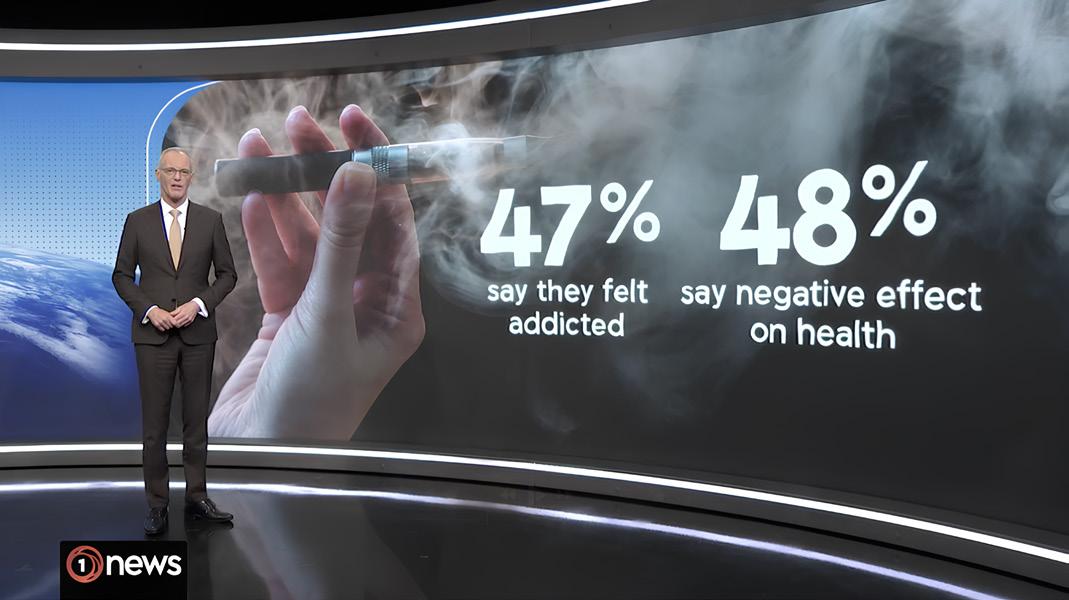
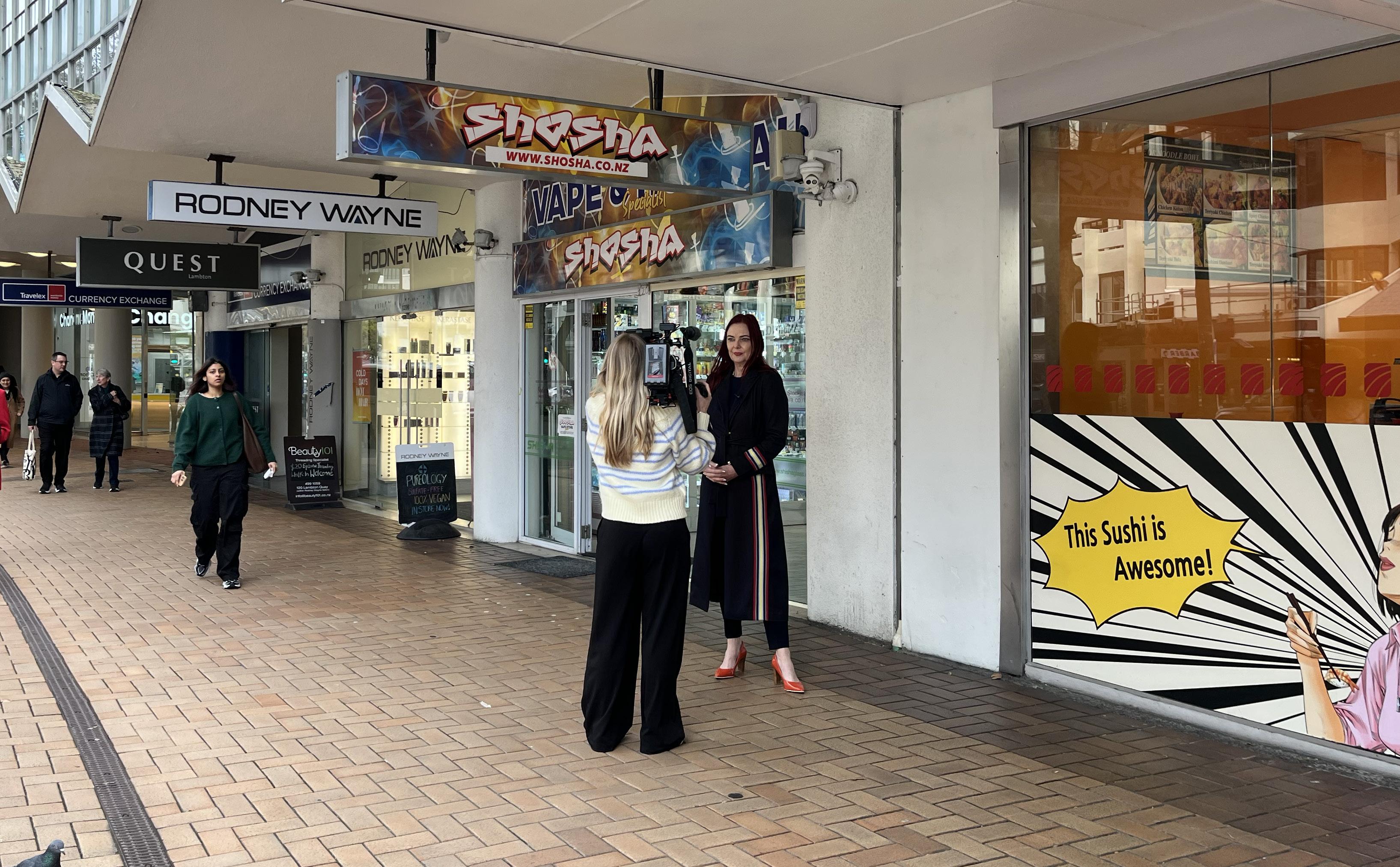
Raising our national profile
Raising our national profile helps us drive change, reduce inequities, and keep respiratory health on the public agenda. This year, we achieved this through initiatives like Blue Shirt Day, quarterly publications, widespread media coverage, and growing digital engagement – reinforcing the Foundation’s role as a credible voice in respiratory health.
Blue Shirt Day
This year, for World Asthma Day in May, the Foundation hosted its inaugural Blue Shirt Day, where we invited New Zealanders to wear blue and donate. We also sold limited edition t-shirts for the day. We were supported by a number of Friends of the Foundation partners and other New Zealand businesses. The campaign surpassed its fundraising goal, raising just under $12,000. The Foundation plans to host it again next year.

$11,819.88
Better Breathing magazine
The Foundation’s magazine, Better Breathing, is published quarterly to coincide with seasons. It contains a mix of community news, health advice and tips from respiratory professionals, updates from the Foundation on its work and features on topical issues. It keeps both general public and medical professionals informed of the Foundation’s activity and increases the Foundation’s profile. About 4300 physical copies of the magazine are distributed each quarter, and related eDMs are sent to about 6000 people in our database.
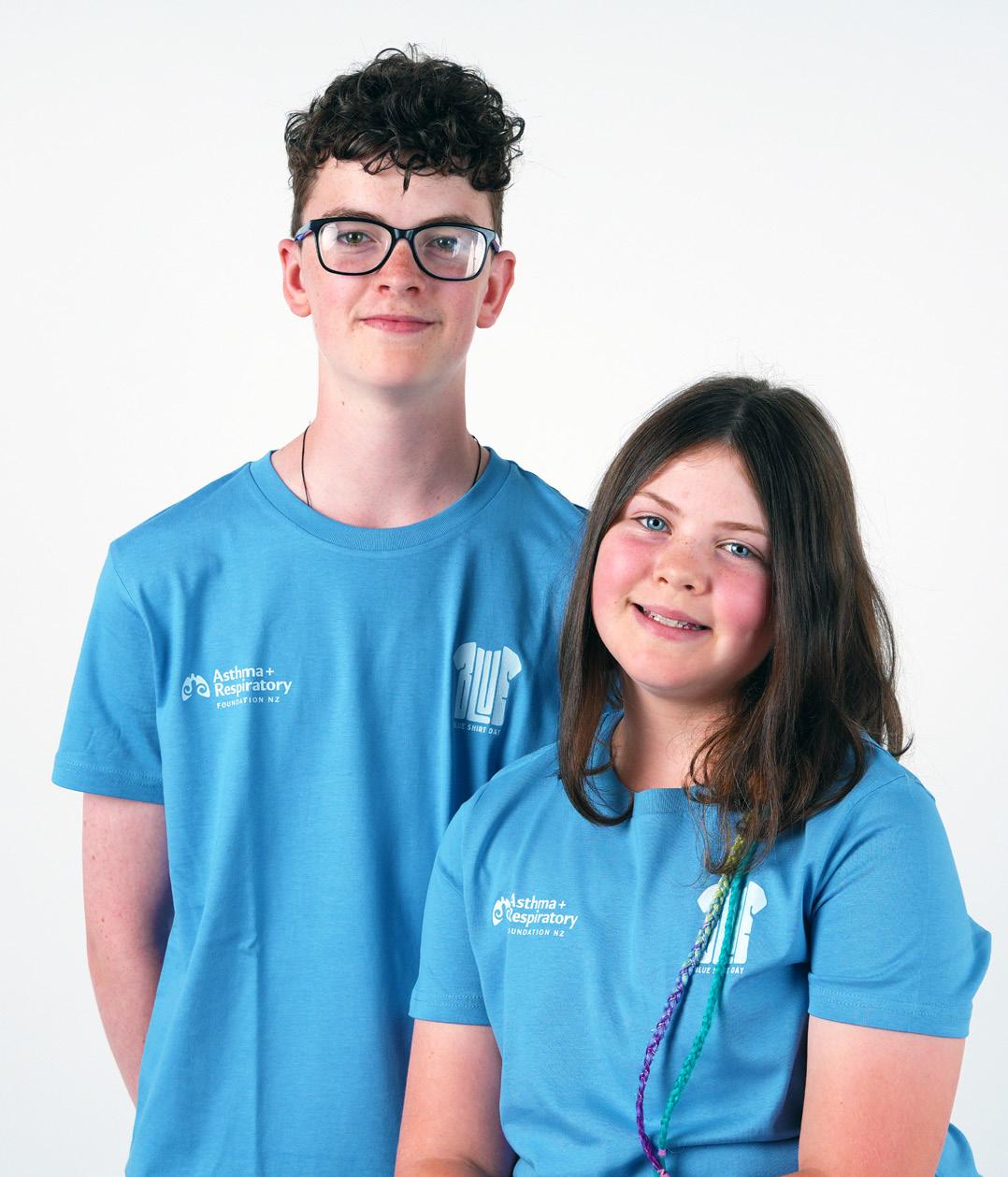
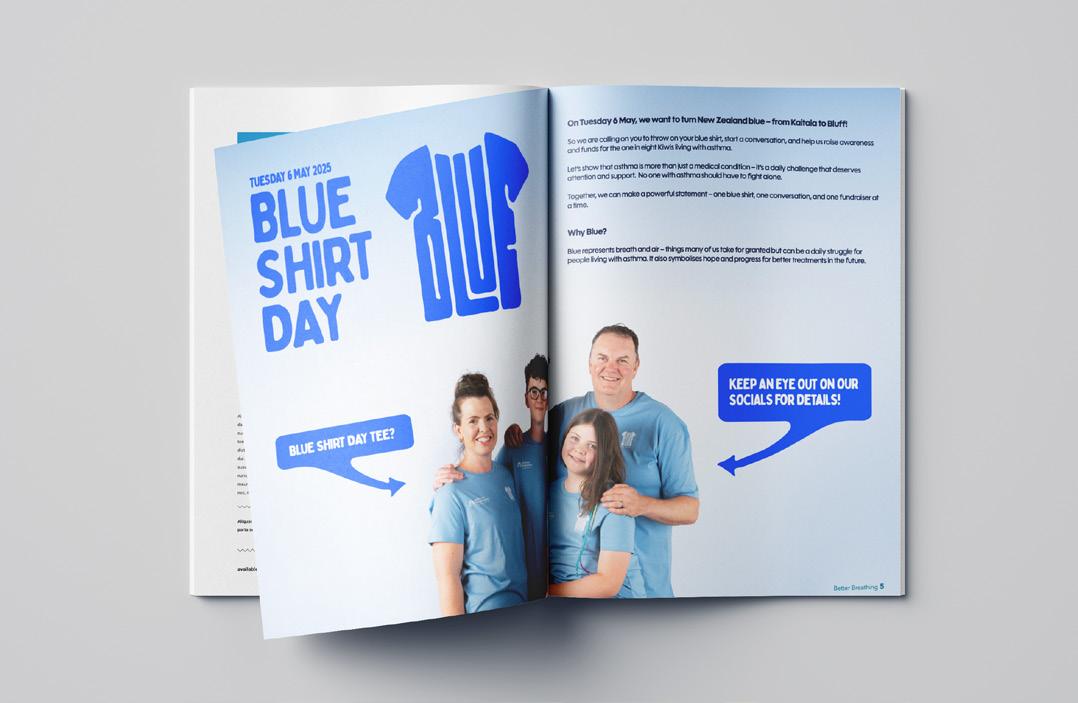
Public relations and media
The Foundation featured on all major New Zealand outlets over the reporting period, as it is seen as a credible source of information on respiratoryrelated topics.
Over the past financial year, 33 media releases were sent out, resulting in 348 media mentions across radio, print, TV and online. The majority of the coverage stemmed from the release of the 2023 Respiratory Impact Report (Sept 2024) and the 2024 Vaping Survey (Nov 2024).
Social media
Social media channels continue to be a successful way of distributing the Foundation’s content, news, and promoting awareness campaigns to the New Zealand respiratory community and general public. Over the last financial year, all our social channels have continued to see increases in followers and engagement.

475,000 page views on our main website
The Foundation has also explored hosting a TikTok account. Our total social audience is now just under 15,000 people.
11,818
Facebook followers
2,256 Instagram followers
764
LinkedIn followers
364
YouTube subscribers
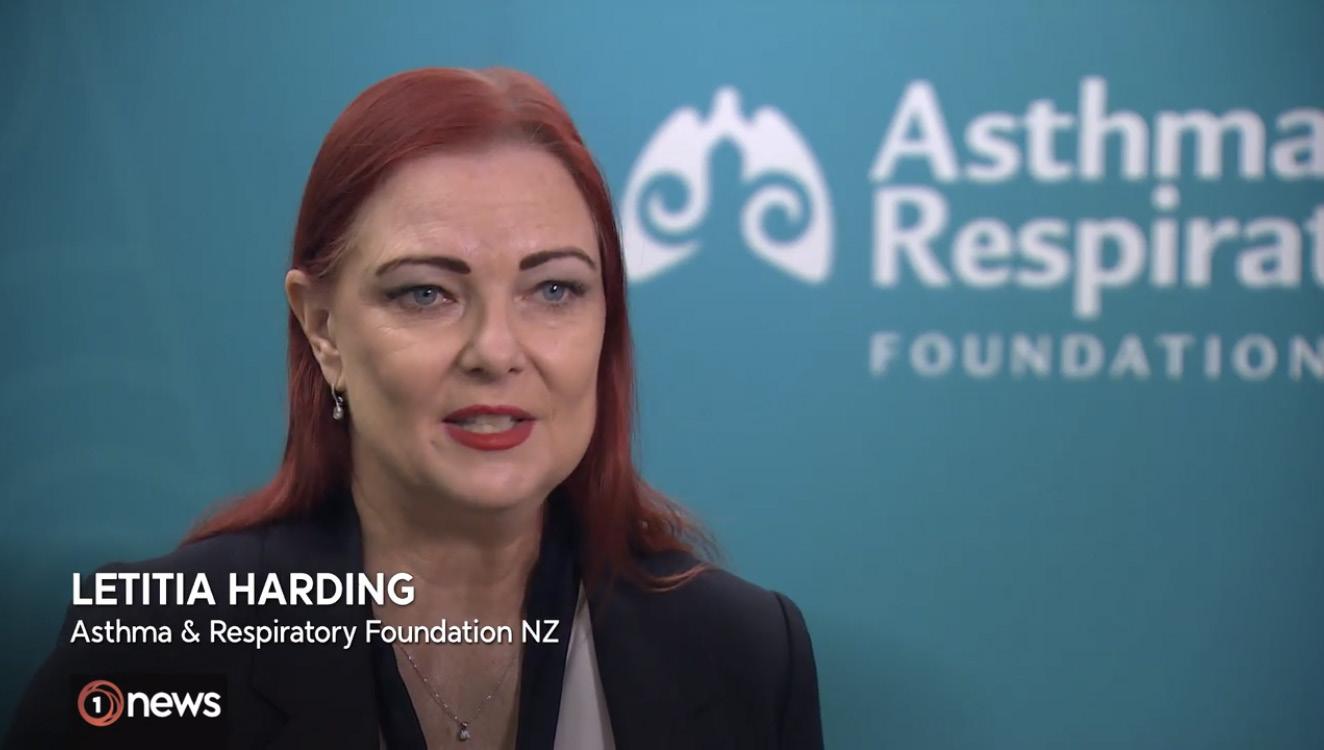
Board of Trustees
The Foundation’s team is governed by a volunteer Board of Trustees who ensure that the Foundation achieves its strategic goals along with the Chief Executive. The details below are current as of 1 October 2025.
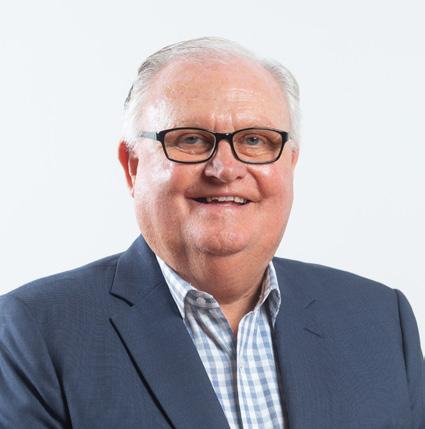
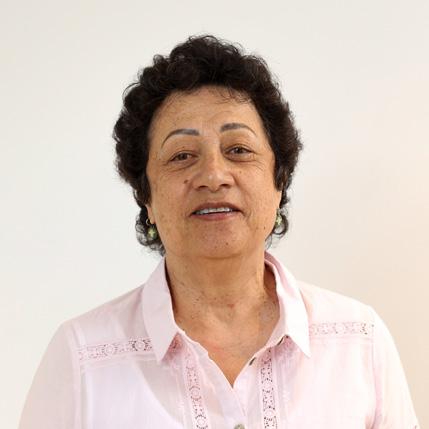
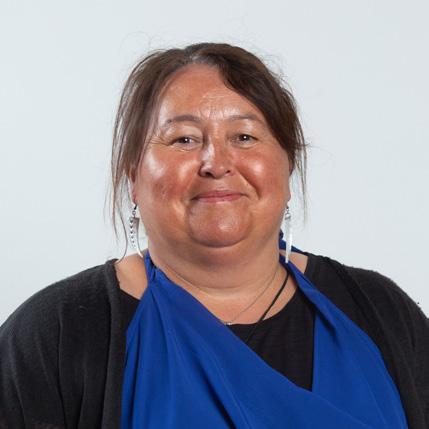
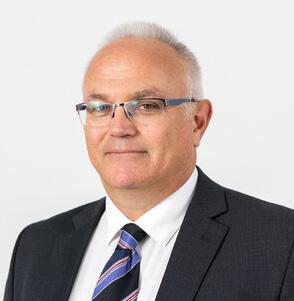
John G. Knight – Chairman
John has held governance roles in respiratory health for many years, at both the regional level (Asthma Hawke’s Bay) and at a national level with the Foundation. John is a strong advocate for respiratory health, having lived with a chronic condition his whole life. This experience drives his desire to improve respiratory outcomes for all New Zealanders. John works in the real estate industry and is an experienced trustee, with a sound understanding and knowledge of governance, leadership, planning and management. He feels privileged to lead the Board and to work with a group of passionate, committed people working hard to make a difference.
Janice Kuka (Ngāti Ranginui, Ngāi Te Rangi) – Co-Chair
Janice’s current role is Managing Director at Nga ā Mataapuna Oranga, a Māori PHO covering the Western Bay of Plenty and parts of the Eastern Bay of Plenty. Janice comes from a professional background within the health industry and has experience both in hospital and community sectors. She sits on a number of health boards in Tauranga as well as Auckland.
Jeannine Stairmand (Ngāti Porou, Tauiwi)
Jeannine Stairmand is a member of the Cancer Control and Screening Research Group, working on the C3 Qualitative Study: Cancer care journeys and clinical decision making, of which Associate Professor Louise Signal is the Principal Investigator. Jeannine is a nurse with a Postgraduate Diploma in Public Health who has worked in the Māori and public health fields for the past 20 years. Her interest in cancer stems from her work in Māori health, public health and health promotion, particularly breast and cervical screening. Jeannine’s research interests include Māori health, cancer and health promotion and prevention. Jeannine undertakes community service activities and is a ministerial appointment to the National Kaitiaki Group.
Philip Aldridge
Philip Aldridge is an experienced Executive Manager and Director. He is currently Chief Executive at Waihanga Ara Rau (the Construction and Infrastructure Workforce Development Council). Philip has worked across both private and government sectors and has held management roles at Infratrain NZ, HASANZ, Telecom New Zealand, The Treasury, and the Foundation for Research, Science and Technology (FRST). He has led mergers/ amalgamations, set up private/public partnerships, developed and successfully implemented strategic plans, managed a NZ$2 billion investment portfolio and developed new channels to market. He has a BSC (Hons), an MBA, and has studied at Sloan School of Management (MIT) in Boston.
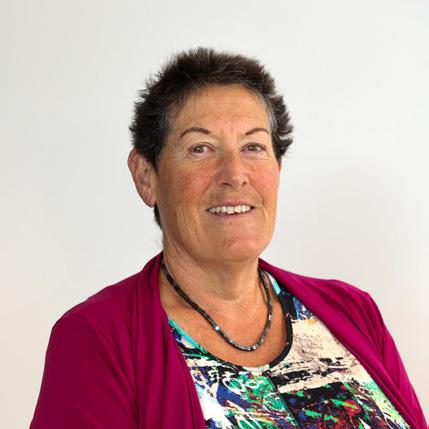
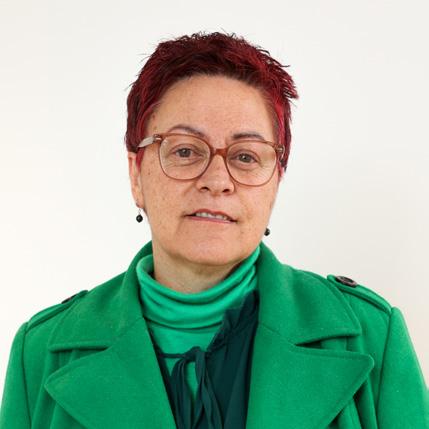
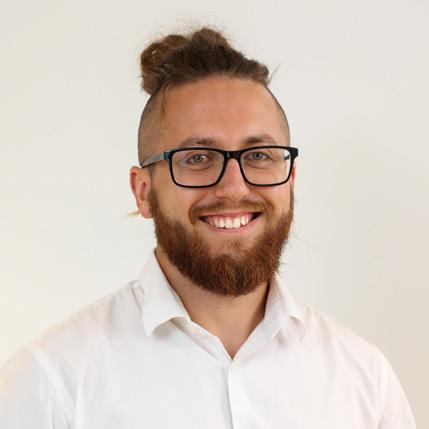
Ruth Gardener
Ruth is a retired registered nurse with a particular interest in respiratory health and education. Ruth lectured at the Otago Polytechnic School of Nursing and prior to this worked as a clinical nurse respiratory educator at Dunedin Hospital and in a general practice. Ruth is committed to advocating for people with respiratory conditions to ensure they have access to education and services to help them manage their disease. To assist this process, Ruth believes that primary, secondary and tertiary care providers need to work closely together to effectively use, strengthen and develop services for people.
Cheryl Davies (Ngāti Raukawa, Ngāti Wehiwehi)
Cheryl has managed the Tū Kotahi Māori Asthma Trust over the past 29 years. Tū Kotahi was formed as the first Māori Asthma Society in New Zealand in the early 1990s. Cheryl has presented at a number of conferences both nationally and internationally with a focus on discussing Māori and respiratory illnesses and healthy housing. Cheryl has a keen interest in research involving Māori and has been involved with a number of key research projects over the past 20 years.
Taumata O Te Rā (Ngāti Manomano, Ngāti Raukawa, Ngāpuhi, Ngāi Tūhoe)
Taumata is of Ngāti Manomano, Ngāti Raukawa, Ngāpuhi, and Ngāi Tūhoe descent. At the age of 8, he suffered from an almost lethal asthma attack, affecting the way he lived his life greatly. Since this event, he has spent his life learning what it’s like to live with asthma, and how to live his life best to help keep it under control. Leadership and responsibility for health and well-being have been very important to him. This led him to pursue fundraising for the Asthma and Respiratory Foundation through running to prove that, even with asthma, it is possible to live a healthy and happy life while keeping it under control. He is honoured to sit on the Board of such a great organisation which aims to help people understand that respiratory conditions don’t have to control your life.
Chief Cultural Advisor – Māori
Sir John Clarke, KNZM, CNZM (Ngāti Porou, Ngāpuhi, Ngāti Kahungunu)
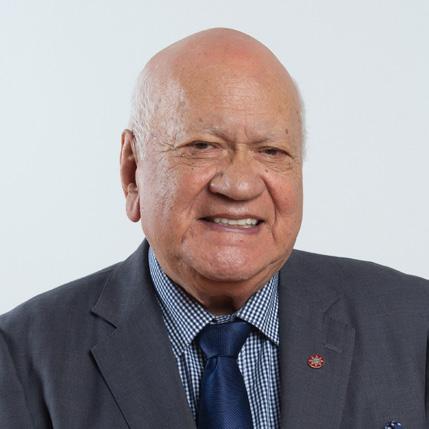
Sir John’s role with the Foundation includes providing advice on the various aspects of tikanga Māori and protocols, and representing the Foundation to raise awareness within the wider Māori community and with other key stakeholders. Sir John is also the current Principal Cultural Advisor to the Minister of Treaty of Waitangi negotiations. He regularly provides consultancy services to the Crown Law Office, the Office of the Treaty Settlements, and the policy division of the Ministry of Justice.
He has played a major part in Māori-Crown relations and has been the principal cultural advisor to all Ministers of Treaty Settlements for more than 25 years. He has conducted eight major inquiries as a member of the Waitangi Tribunal. In 2023 he successfully conducted mediation on the South Island Customary Fishing Regulations involving involving eight iwi o Te Tau Ihu o Te Waka a Maui (top of the South Island). Sir John is currently the longest serving chairperson of the Māori Heritage Council Aotearoa New Zealand, deputy chair of the Board of HNZPT (Heritage New Zealand Pouhere Taonga) and principal advisor to the Asthma and Respiratory Foundation and Pharmacy Council. He is a Responsible Trustee of Te Rimu Ahuwhenua Trust and Tokararangi Forest Trust. He is also a former Trustee of the Sir Winston Churchill Memorial Trust and the Ann Frank Trust.
Our team
The Foundation’s team is made up of a group of dedicated individuals who work tirelessly to help New Zealanders breathe better. The details below are current as of 1 October 2025.
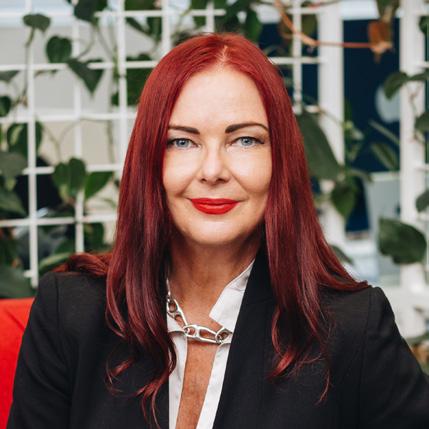

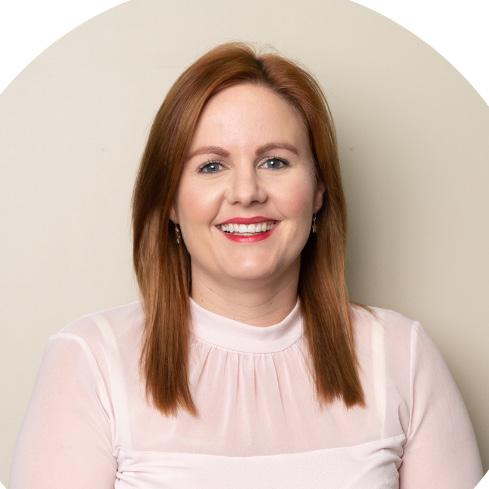

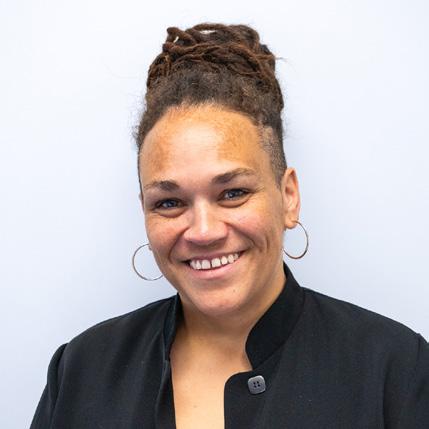
Letitia Harding – Chief Executive
Letitia has over 25 years experience in the health sector, which includes the introduction of new health technologies, improving access to medicines, initiating imaging and diagnostic trials and establishing international healthcare networks. Letitia has sat on a number of international and national advisory boards. She has held senior management positions in both the corporate diagnostic and pharmaceutical industry, and collaborated with many NGOs over the years - which ignited her passion for the not-for-profit sector.
Joanna Turner – Deputy Chief Executive & Education and Development Manager
Joanna is responsible for overseeing and managing the development and implementation of key education programmes. She sits on the ARFNZ Scientific Advisory Board and assists in the development and dissemination of the NZ Child Asthma Guidelines, the NZ Adolescent and Adult Asthma Guidelines and the NZ COPD Guidelines. Joanna is a registered pharmacist with an extensive background working in community pharmacy.
Chloe Bradwell – PR and Comms Marketing Manager
Chloe is the head of the Marketing team at the Foundation, working to promote the organisation and increase awareness of respiratory disease through media and across all other channels. Chloe has a background in communications and events management. Prior to this, she was a business and general news print journalist for Stuff and The Post (formerly The Dominion Post).
Sam Treseder – Marketing and Communications Advisor
Sam is our Marketing and Communications Advisor and works to promote the organisation and its activities across all our channels, as well as leading our in-house graphic design. Sam has previously worked with charity organisations in the UK and has prior experience coordinating a recruitment team focused on finding high-quality educators for disadvantaged schools across England and Wales.
Michaela Tahere – Grants and Fundraising Executive
Michaela manages the Foundation’s grants programme, supporting its mission to improve the lives of those with respiratory illnesses. Her role involves preparing grant applications, reporting to funders, and identifying new funding opportunities to sustain the Foundation’s vital work. She brings with her over a decade of experience in fundraising, with a focus on grant writing, donor relationships, and coordinating campaigns. By building strong connections, Michaela’s mahi is pivotal in supporting Te Hā Ora the Asthma and Respiratory Foundation, to achieve meaningful outcomes.

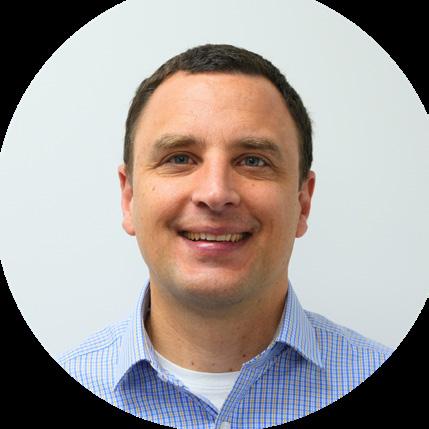
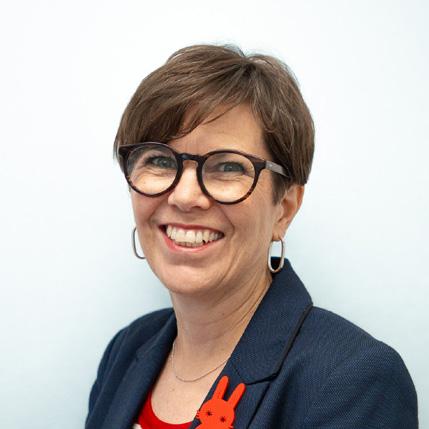
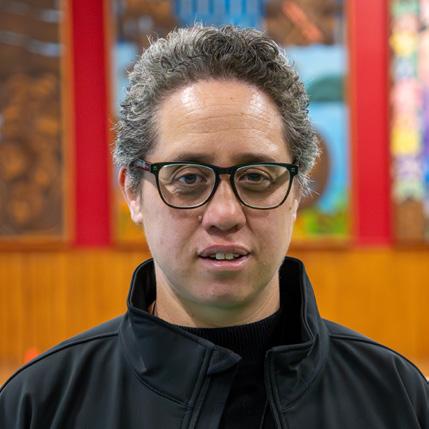
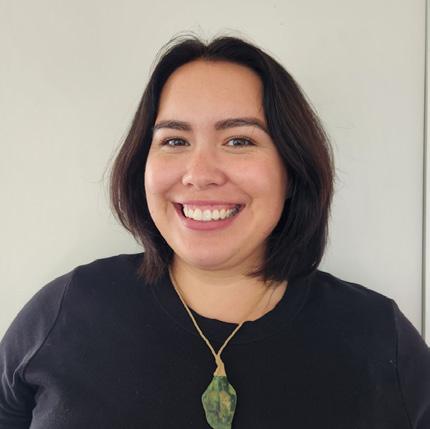
Jared McOnie – Digital Content & Marketing Advisor
Jared is our Digital Content and Marketing Advisor and works to promote the organisation and its activities across all our channels, as well as leading our in-house graphic design. He has previously taken on creative roles on the teams behind major cultural events in Aotearoa, such as CubaDupa, New Zealand Fringe Festival, and Whānau Mārama: New Zealand International Film Festival.
Paul Aschenberger – Corporate Sponsorship and Engagement Advisor
Paul is our Corporate Sponsorship and Engagement Advisor, focused on building and strengthening relationships with our corporate partners through the Friends of the Foundation programme. The support from this programme is crucial to the work of Te Hā Ora, helping to make our efforts possible. Paul brings a strong background in sales and marketing, with valuable experience gained from his previous work in sports and events sponsorship.
Christina Goss – Individual Giving Fundraising Executive & Office Administrator
Christina manages the Foundation’s individual giving programmes and is passionate about donor stewardship; nurturing relationships with donors to encourage ongoing support of Te Ha Ora The Asthma and Respiratory Foundation’s mission to improve the lives of those with respiratory illness. Christina has six years of experience in the fundraising sector in donor care and individual giving.
Sharon Pihema (Ngati Porou, Ngāpuhi, Ngāti Whātua Ōrakei, Ngāti Kahungunu) – Māori Community Liaison Officer & Youth Vaping Educator
Sharon is the Māori Community Liaison Officer for the Foundation and will be supporting the goals of the Foundation’s Māori Engagement Strategy. Building relationships with whānau hapū and iwi organisations to identify how best to support their work in respiratory health will be a key focus for Sharon. She has a background in population health, service development and whānau engagement with previous roles at Tairāwhiti DHB, The National Heart Foundation and The Health Quality and Safety Commission. Sharon brings a wealth of personal experience with her 19 year old daughter Tomairangi living with severe asthma and bronchiectasis.
Pene Joyce (Ngapuhi, Ngāi Tawake) – Community Liaison & Youth Vape Educator
Pene is a community liaison and vaping educator based in Tāmaki Makaurau Auckland. She has a background in smoking cessation and population health. She has a great passion for empowering rangatahi and communities to better care for their health and wellbeing.
A special thanks to previous employees during this financial year: Pam Francombe, Annie Mallett, Martin Boland, and Jack Perris.
Kia ora rawa atu (many thanks) to our supporters
The Foundation’s important work would be impossible without the generous and thoughtful support of individuals, trusts and foundations, sponsors and bequests. Because of this philanthropic support, our vital services remain a lifeline for families and communities across Aotearoa.
Our donor whānau (family)
We continue to be humbled by the trust placed in us and we are inspired by the compassion our generous donors show people living with respiratory illness year-after-year. Their contributions ensure that vital respiratory education and support remain freely available, clinically-sound, and culturallyresponsive – a critical resource for the one million New Zealanders living with a respiratory condition.
A great, big ‘thank you’ goes out to our donors for saving lives, reducing avoidable hospitalisations, and easing pressure on our already-strained health system. Thank you for giving families the knowledge and confidence to stay well and thrive.
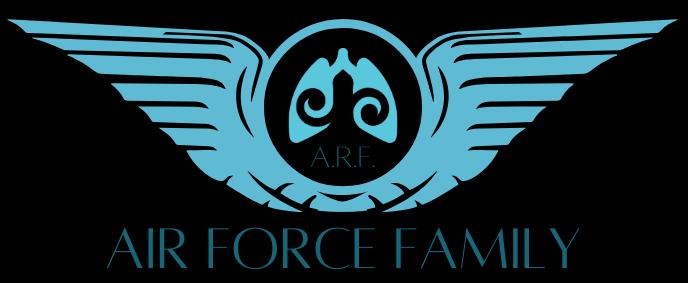
Our cornerstone supporters
Whether it’s empowering young people through vaping harm education, supporting cutting-edge research, or transforming lives through groundbreaking resources, your contributions mean a lot to us and the community we support.
A special thank you to the generous trusts, foundations, and individuals who have supported the Foundation throughout the year.
Bequests
Ngaio Bond Estate
Lesley Cranefield Estate
Kaye Forrest-Brown Estate
Hazel Hensman Estate
Margaret Harrison Estate
Carolyn Frances Huxtable Estate
Gilbertson Family Trust
Graeme Whitefield Estate
Elizabeth Kennedy Estate
Joan Neilson Trust
RM Richards Estate
Joy Rodgers Estate
Robin Russell Estate
John Scott Estate
Henry George Sparks Estate
Clara Stancombe Estate
Charles and Vera Thrush Charitable Trust



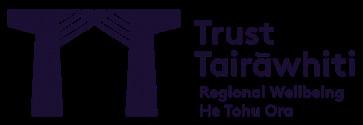

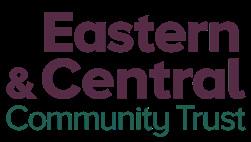
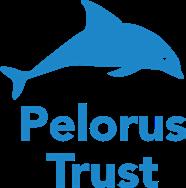
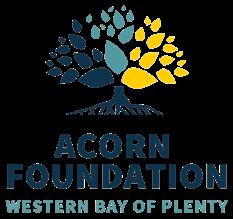

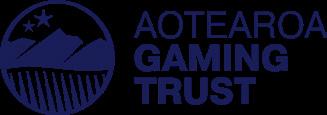
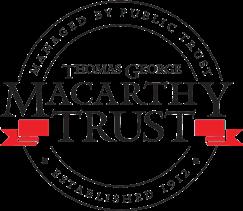


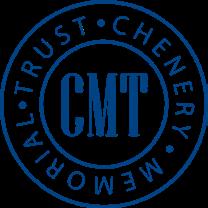
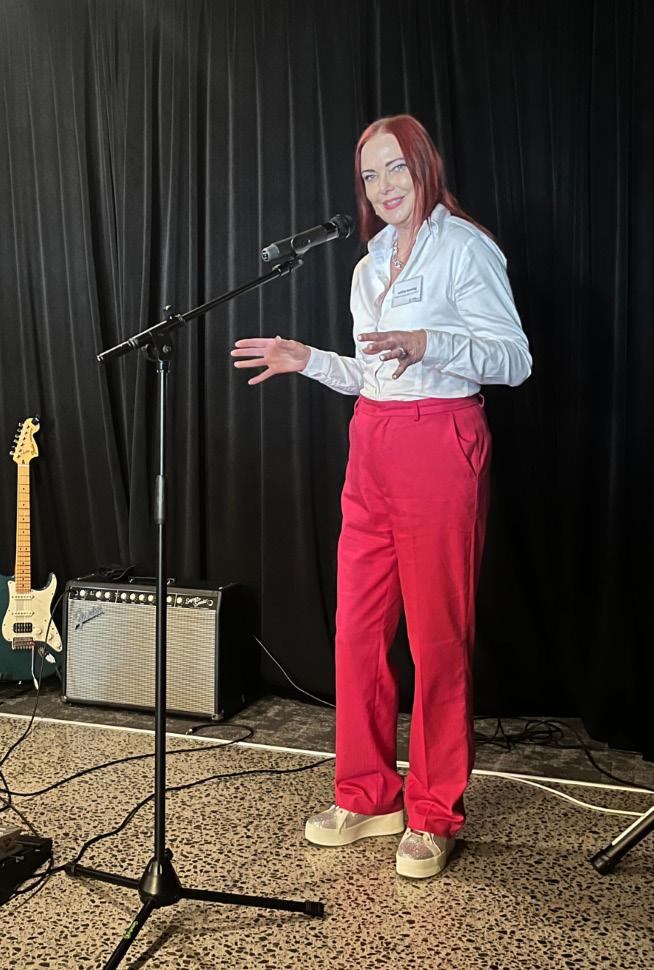
Foundation Chief Executive Letitia Harding at the Acorn Foundation Annual General Meeting.
Structure and governance
Organisational structure
Asthma and Respiratory Foundation NZ is New Zealand’s national authority on respiratory disease, and promotes education, research and advocacy aimed at providing better respiratory health for all New Zealanders. The Foundation’s goal is to lessen respiratory hospitalisations and GP visits and to encourage government funding in this area. The Foundation is a charitable trust, headed by Chief Executive Letitia Harding and a small team of staff that operate out of its Wellington office.
Our Board
Our organisation is governed by a Board which ensures the Foundation is well managed and focused in its activities. The Board also determines organisational policies and assures good financial management.
Scientific Advisory Board
Our Scientific Advisory Board is comprised of New Zealand’s leading experts in respiratory health service delivery and research. The group brings quality assurance and strong credibility to the Foundation’s work by approving all major projects and publications, including position statements on health issues and research proposals.
Advisors
Professor Bob Hancox is a professor of Preventive and Social Medicine at the Dunedin School of Medicine at the University of Otago and a respiratory physician at Waikato Hospital. He chairs the Scientific Advisory Board and is the Medical Director of the Foundation.
Sir John Clarke CNZM, KNZM is the Foundation’s Chief Cultural Advisor - Māori, and advises the Foundation on tikanga Māori.
Funding
The Foundation is heavily reliant on the support of our generous donors, major sponsors, including Pub Charity and New Zealand Lotteries Grants, other grant funders, sponsors, and bequests.
Financial reporting
The financial statements in this report reflect the activities of the Asthma Foundation Group. Regional partners, being autonomous organisations, publish their own independent financial statements.
Patient care services are carried out by regional partners*. Each partner fulfils its local role according to how it can address its community’s needs.
Services may include:
• One-on-one advice about asthma and respiratory health
• Asthma and COPD support groups
• Spirometry testing (lung function testing)
North Island
Asthma Waikato
Asthma and Respiratory Management BOP Inc
Eastern BOP Asthma and COPD support group
Breathe Hawke’s Bay
Tu Kotahi Māori Asthma Trust (Lower Hutt)
Manawatū Breathe Easy Support Group
Horowhenua Breathe Easy Support Group
South Island Regional partners
Marlborough COPD Support and Exercise Group
Respiratory Support Nelson
CanBreathe Canterbury
Asthma Otago
Financial Report
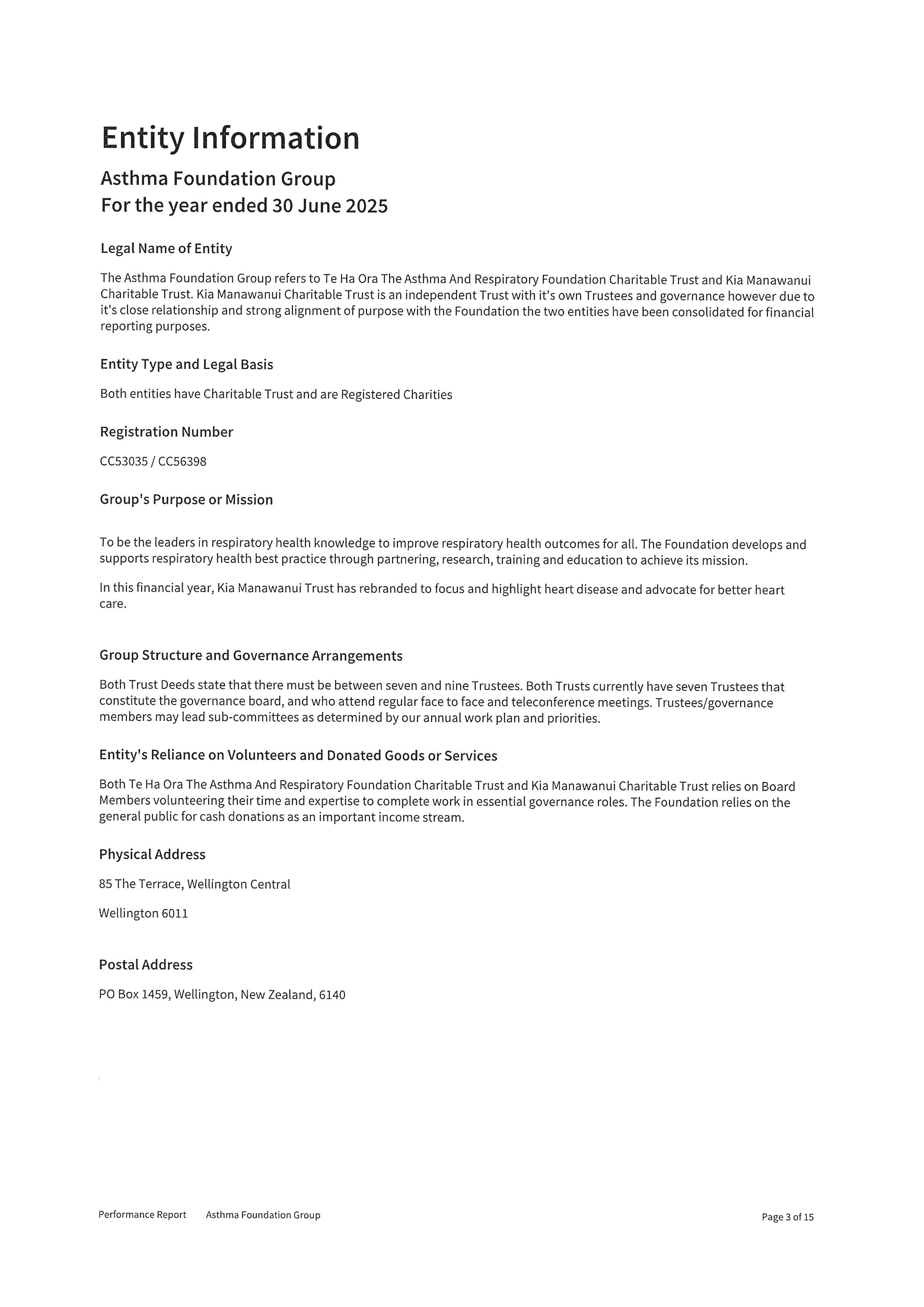
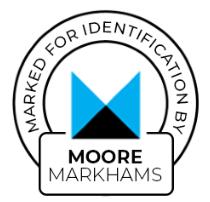
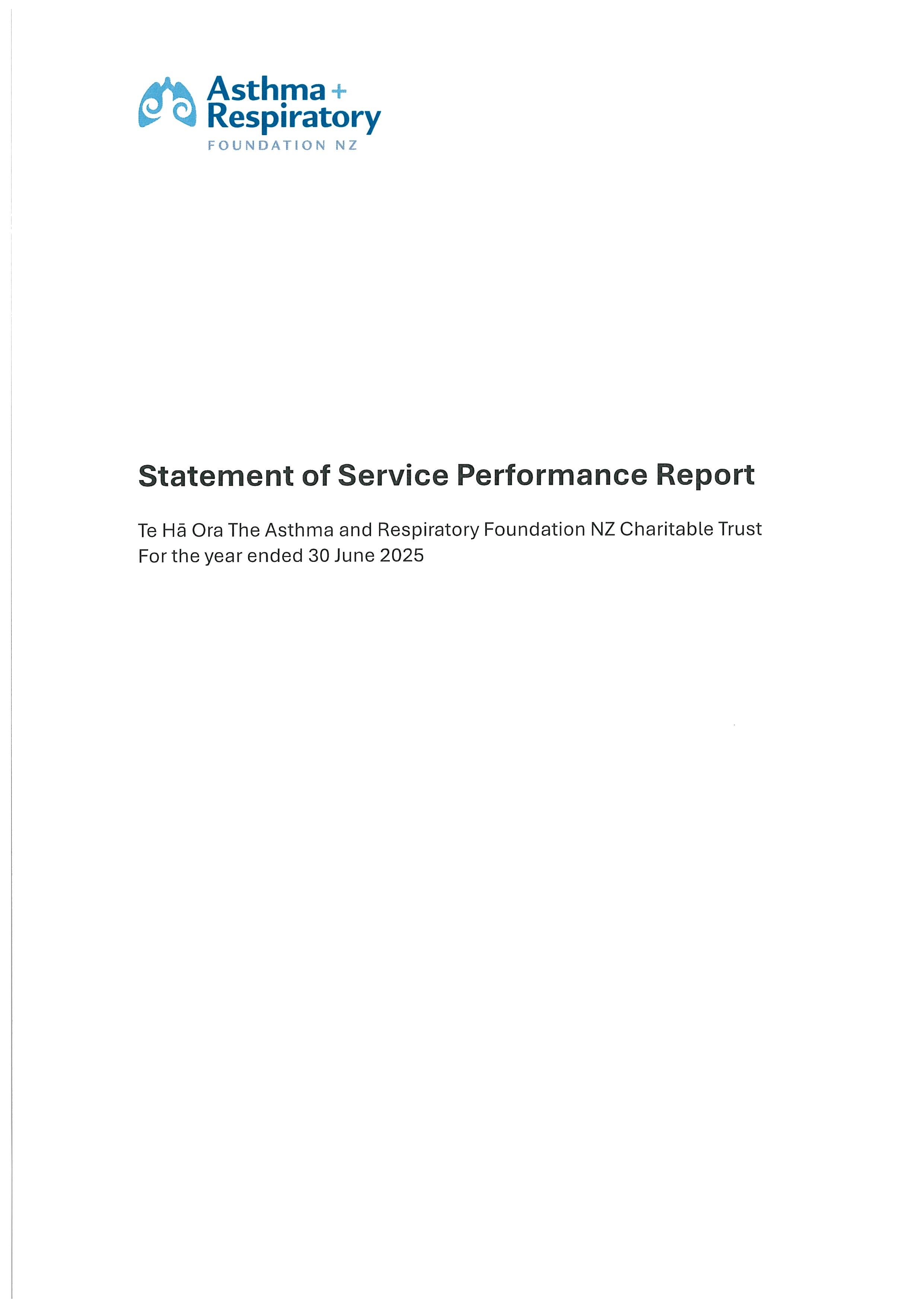


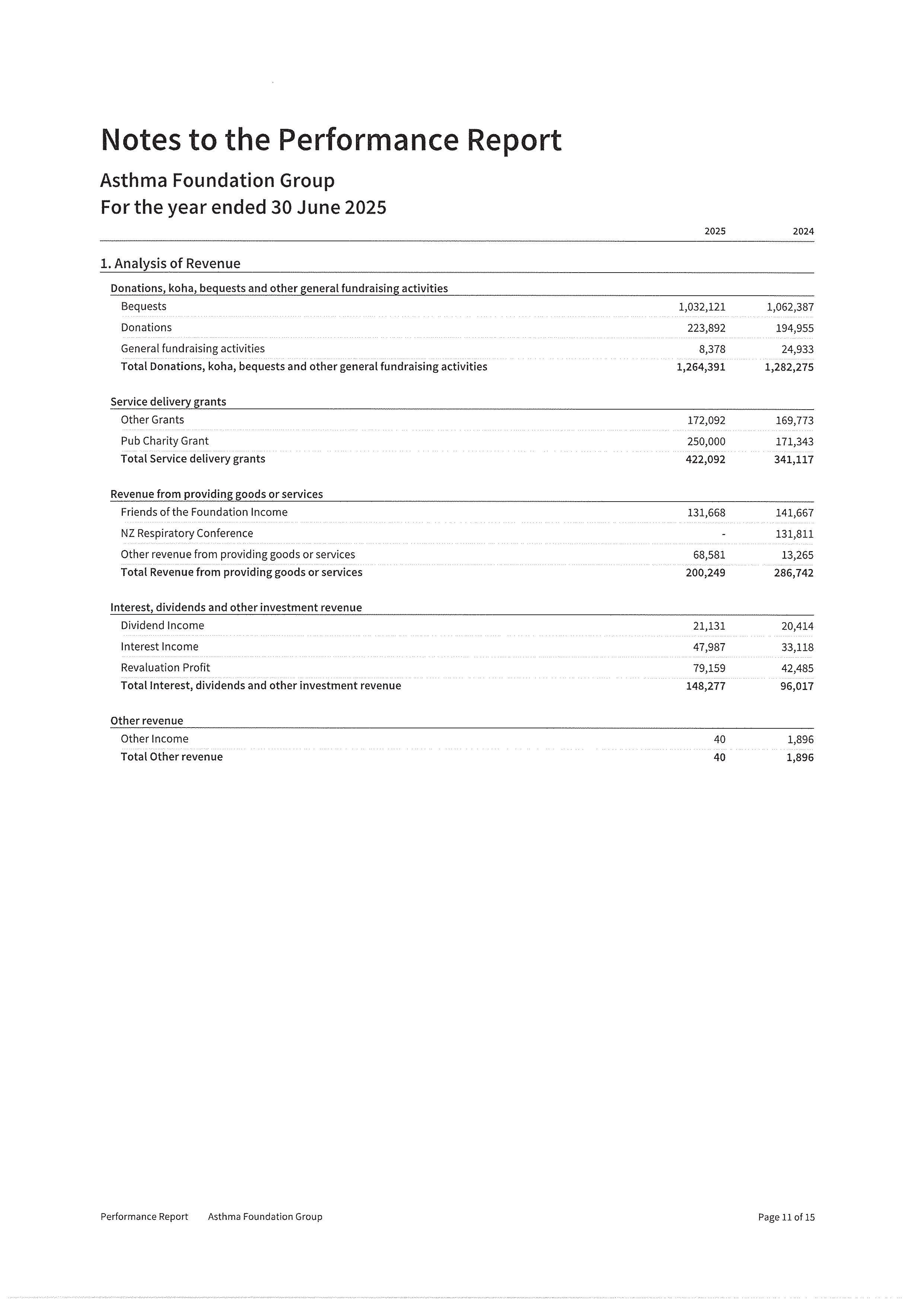
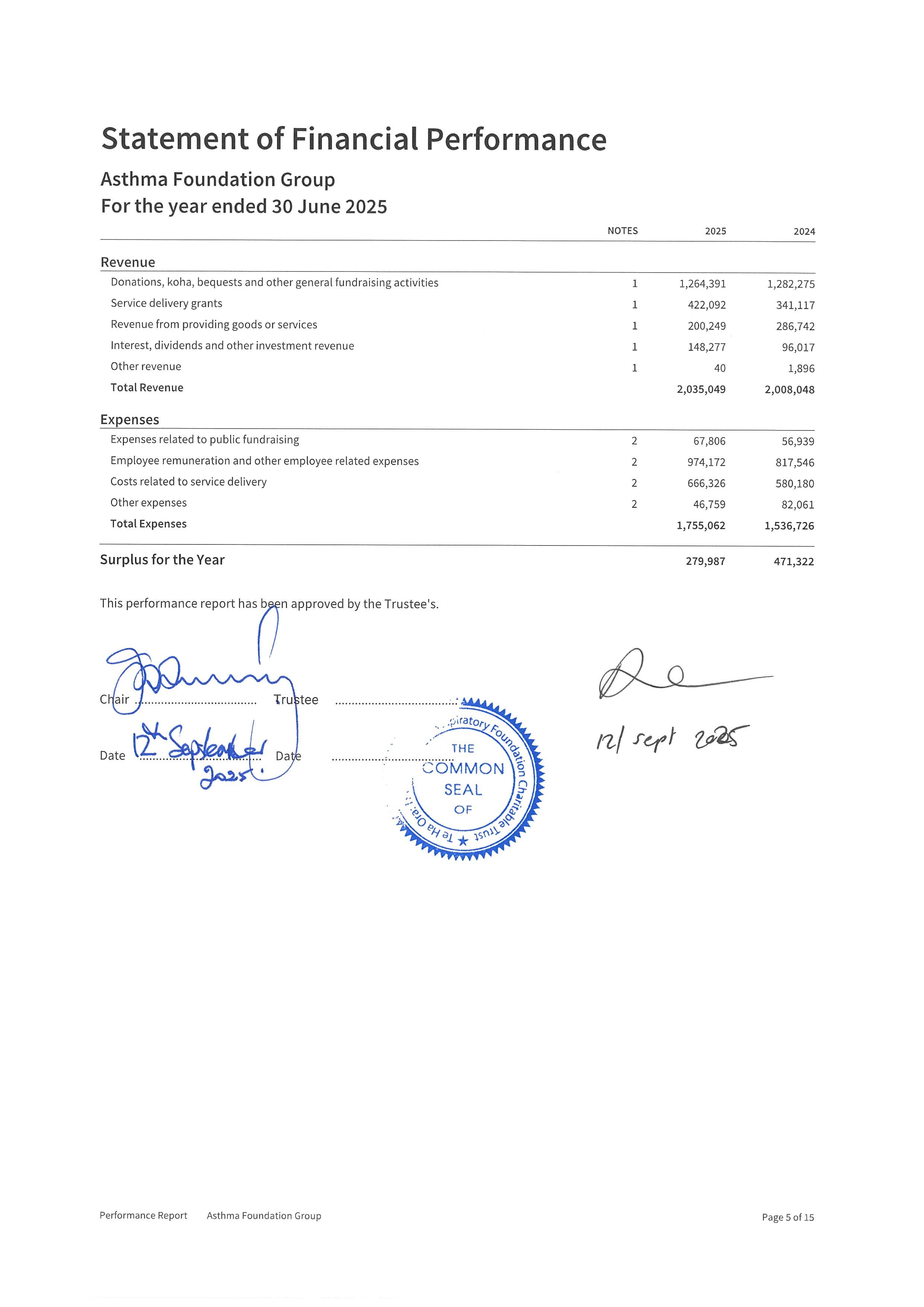
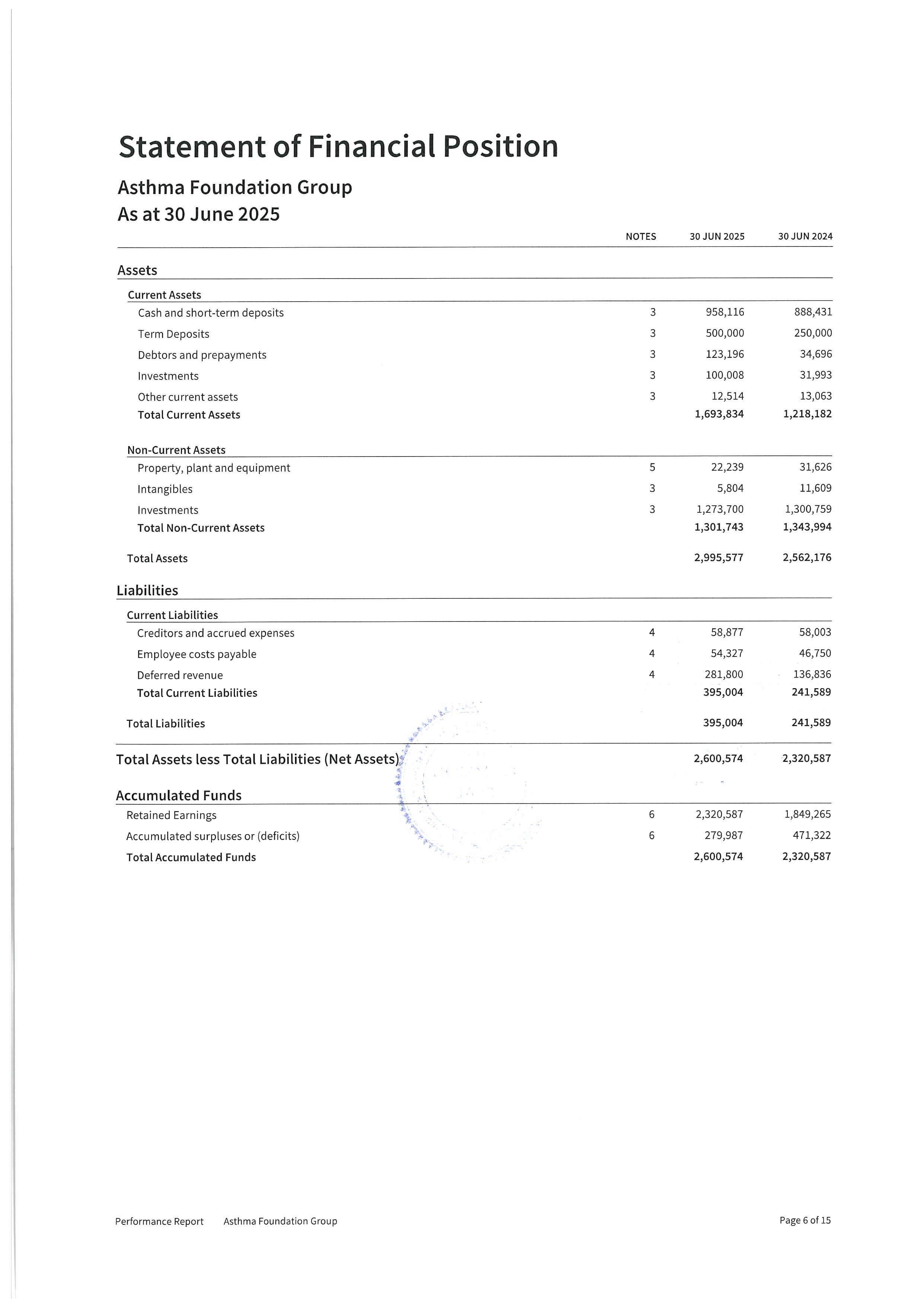

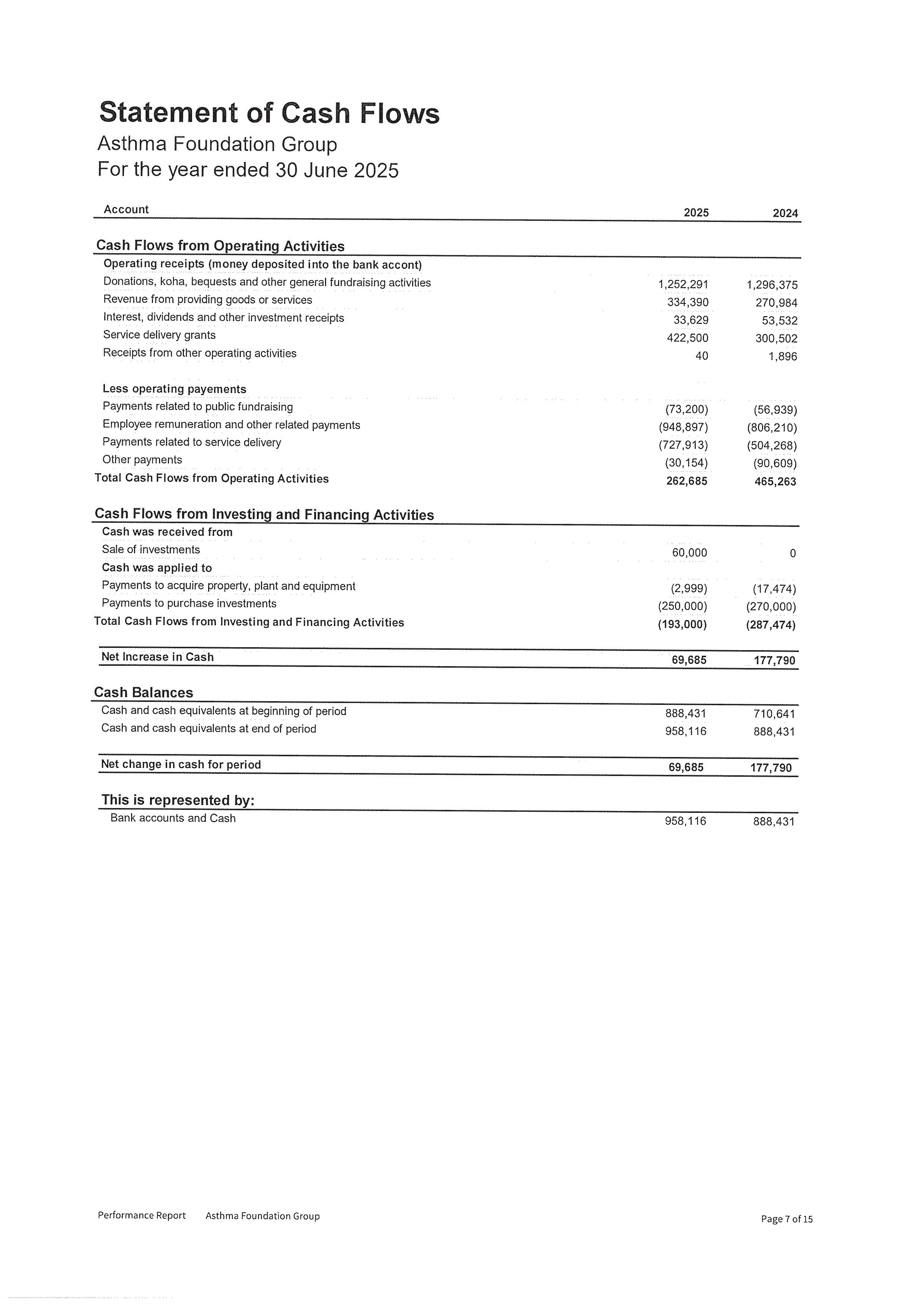

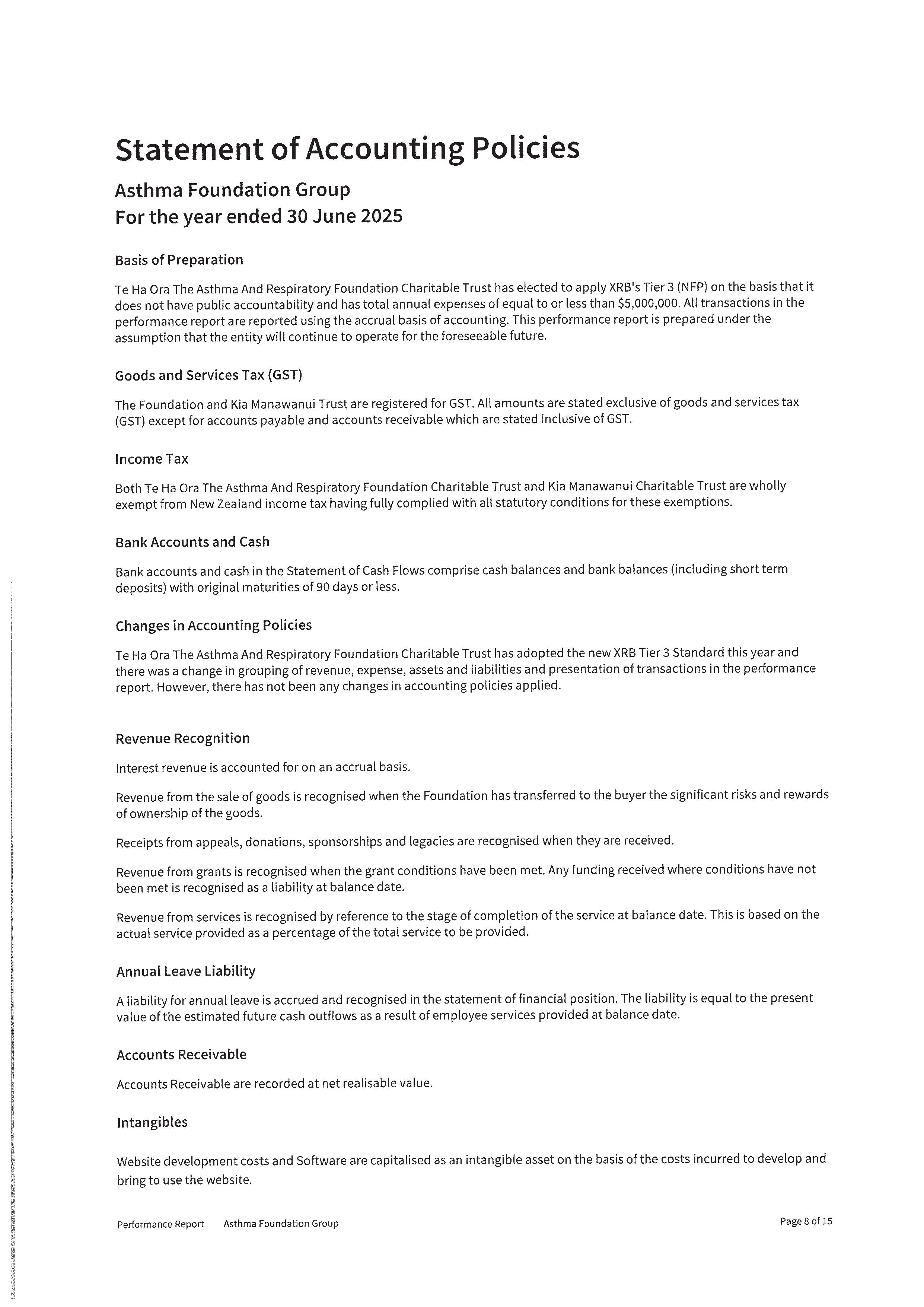

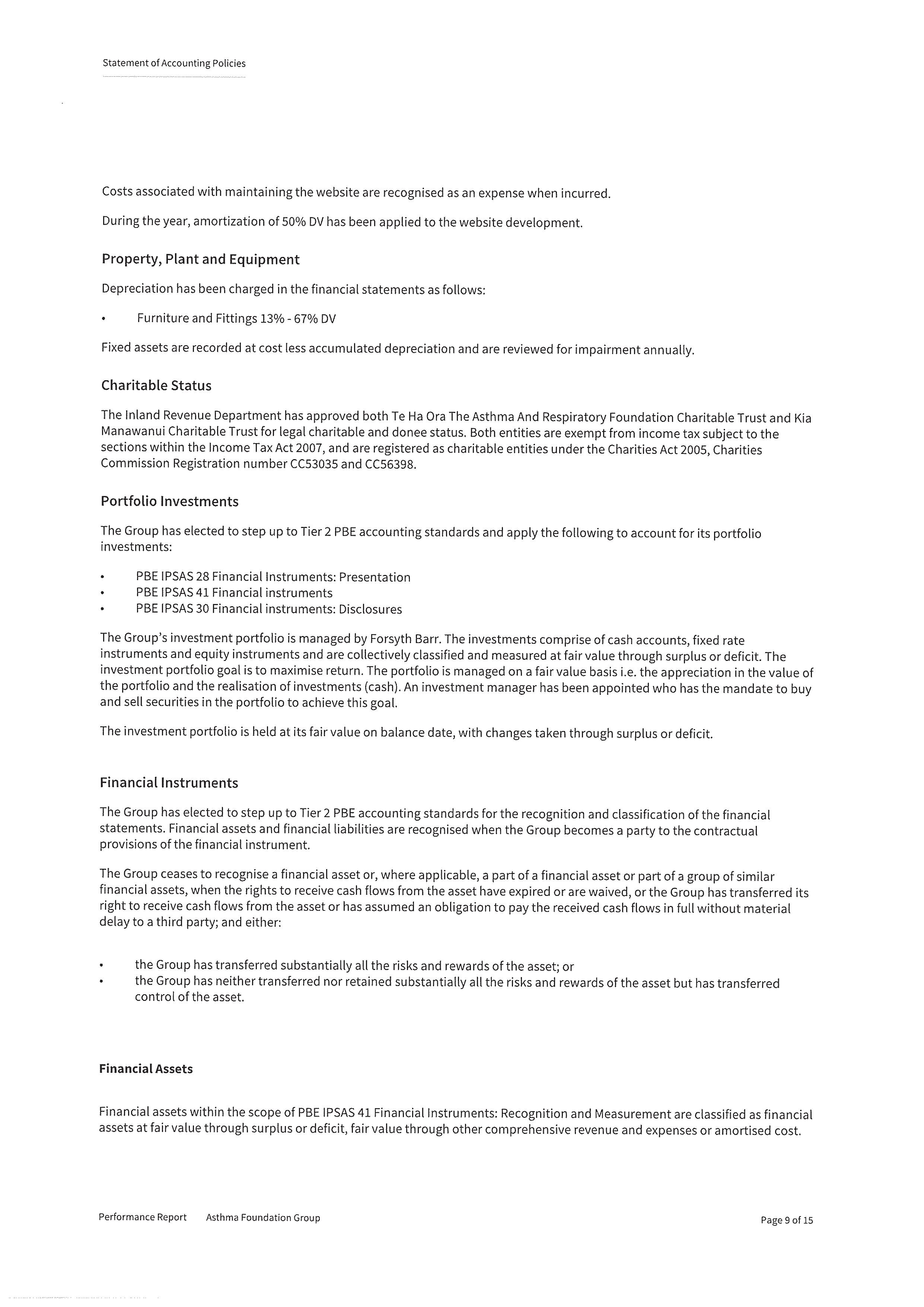

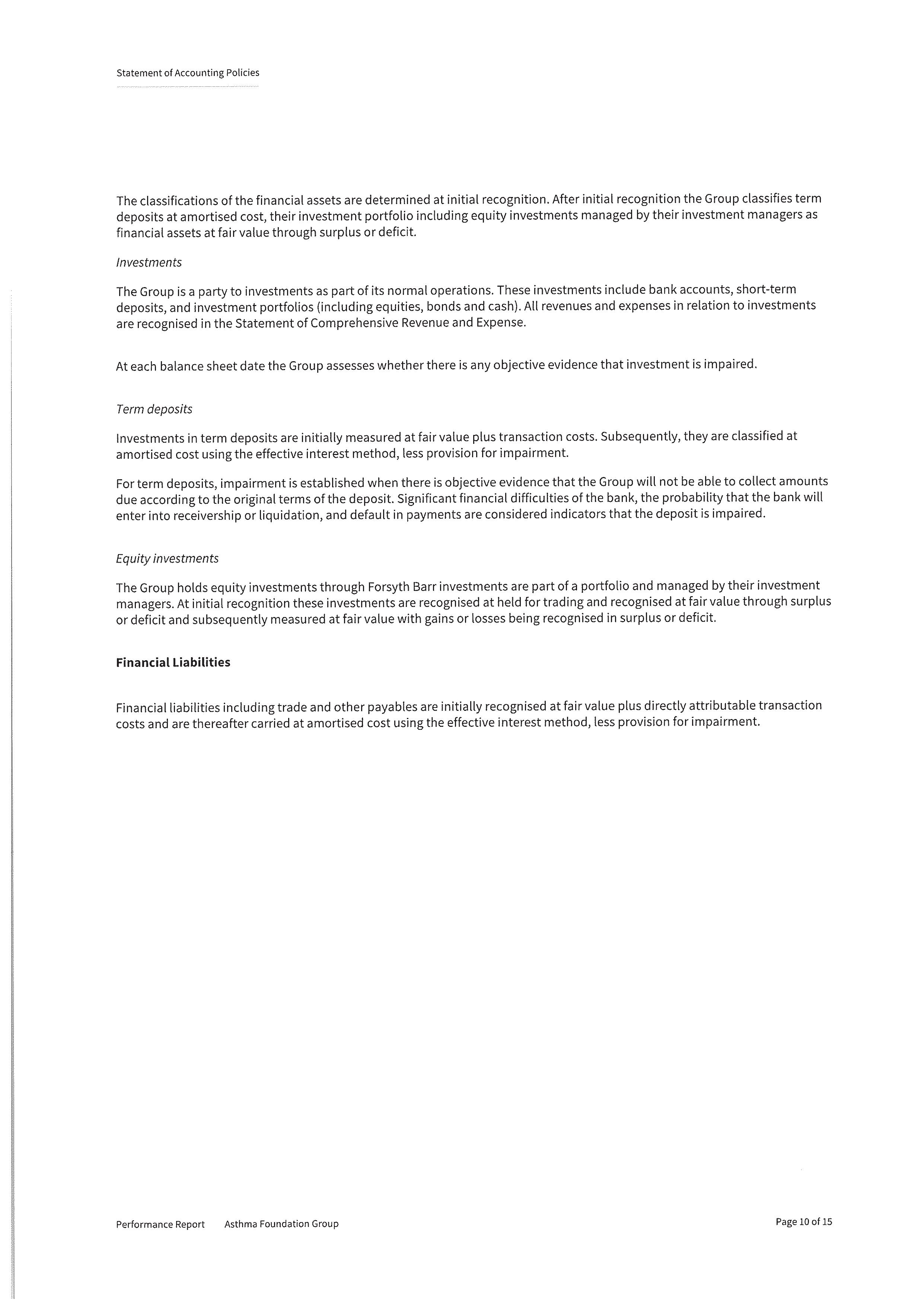



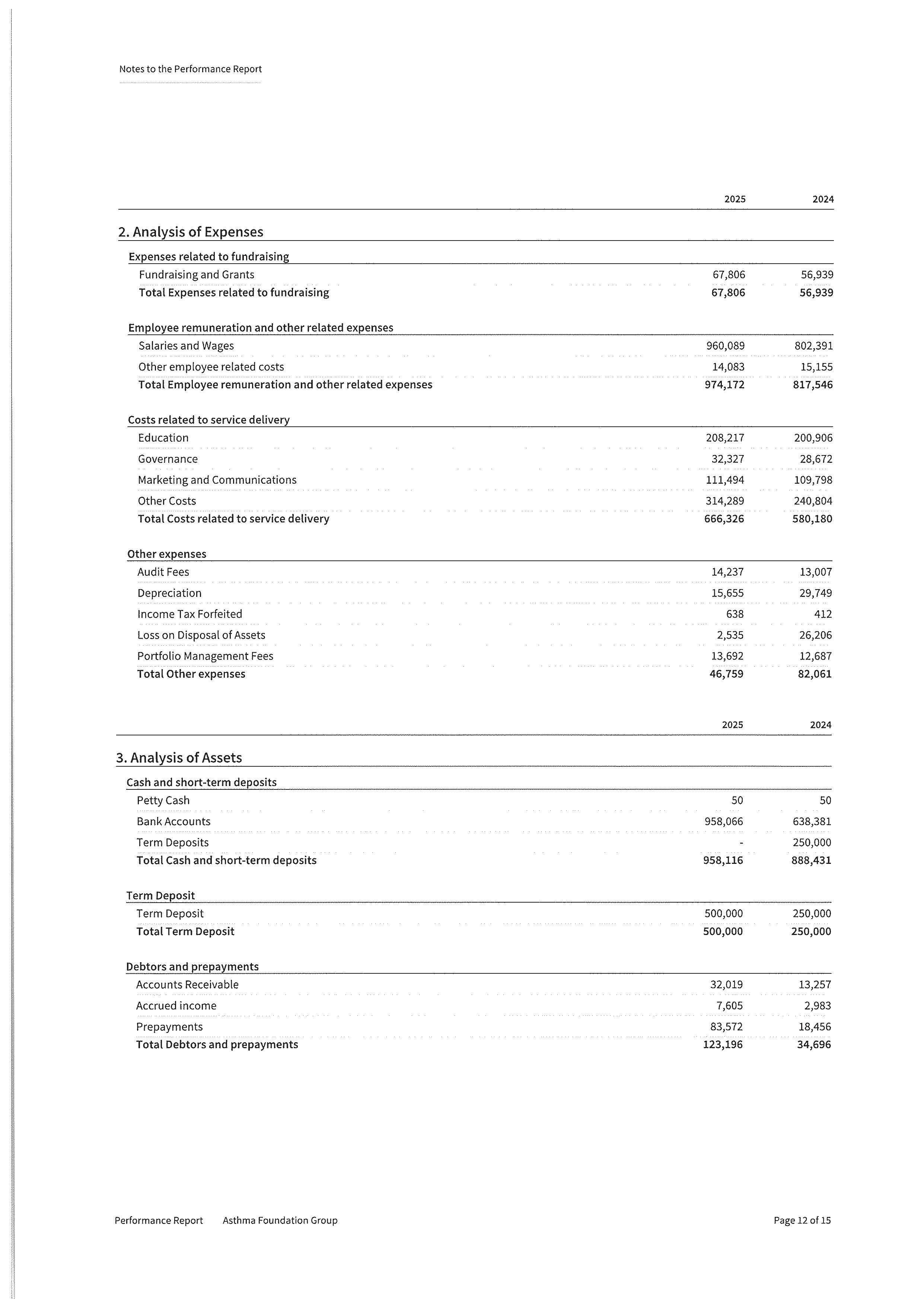

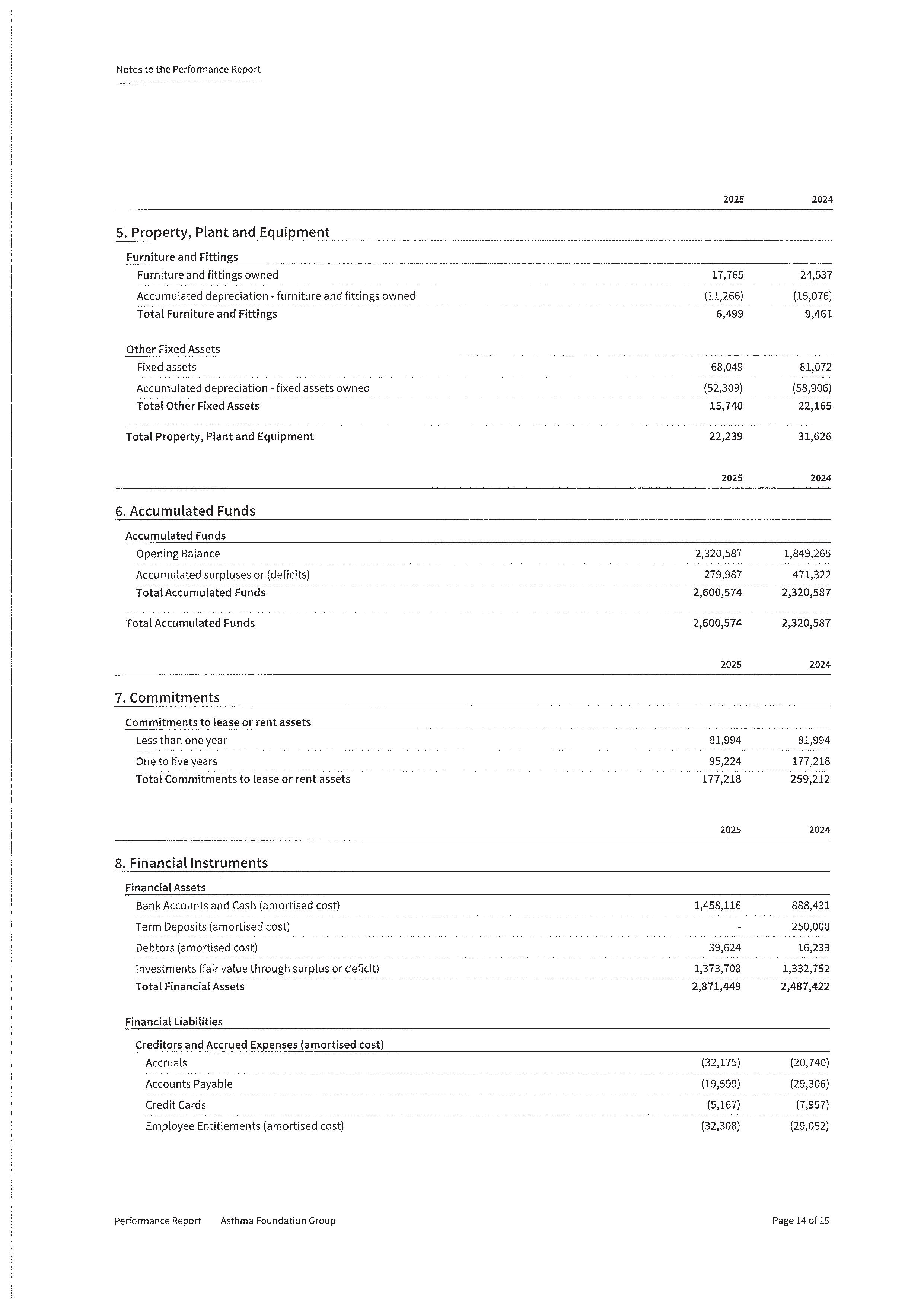

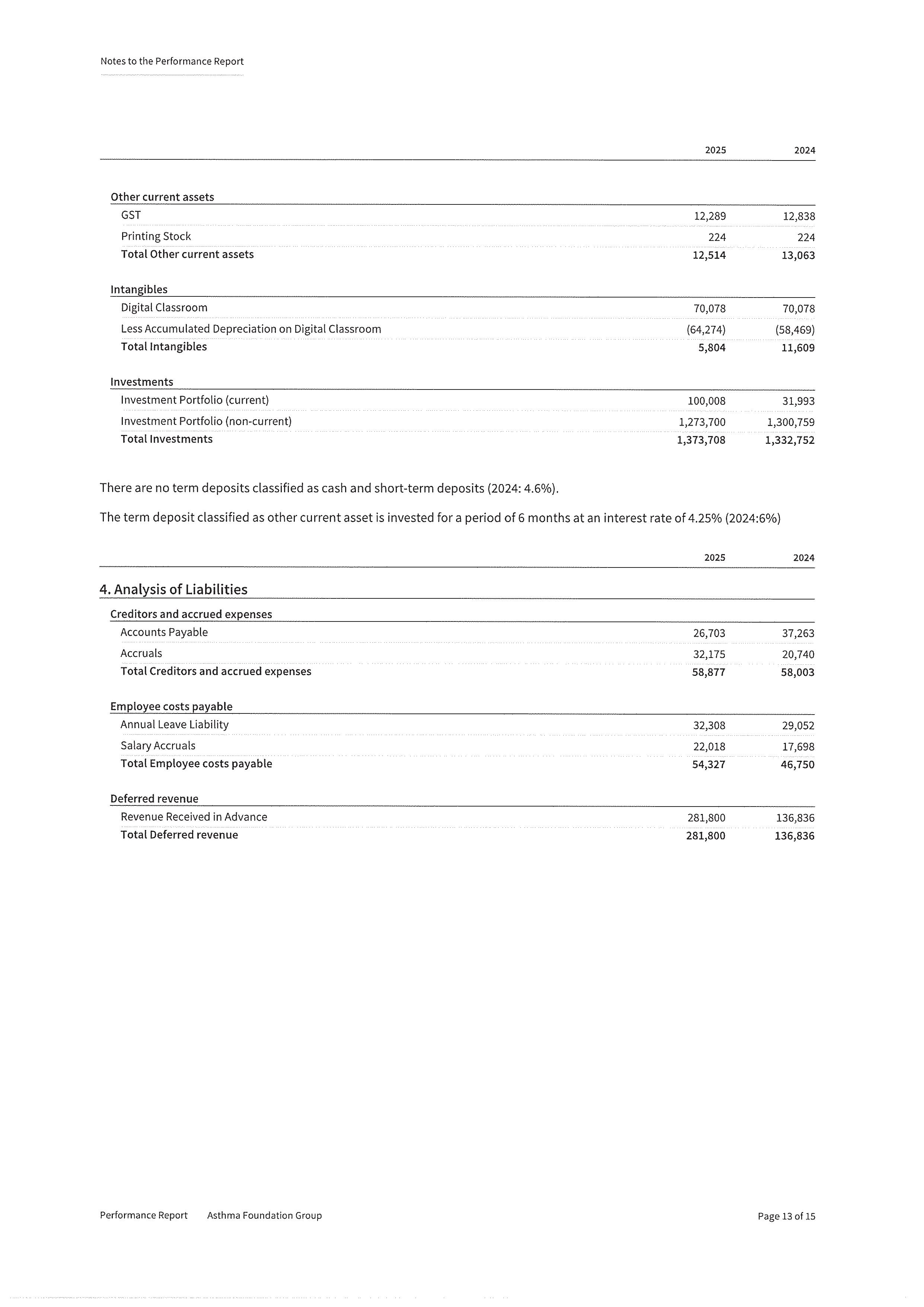


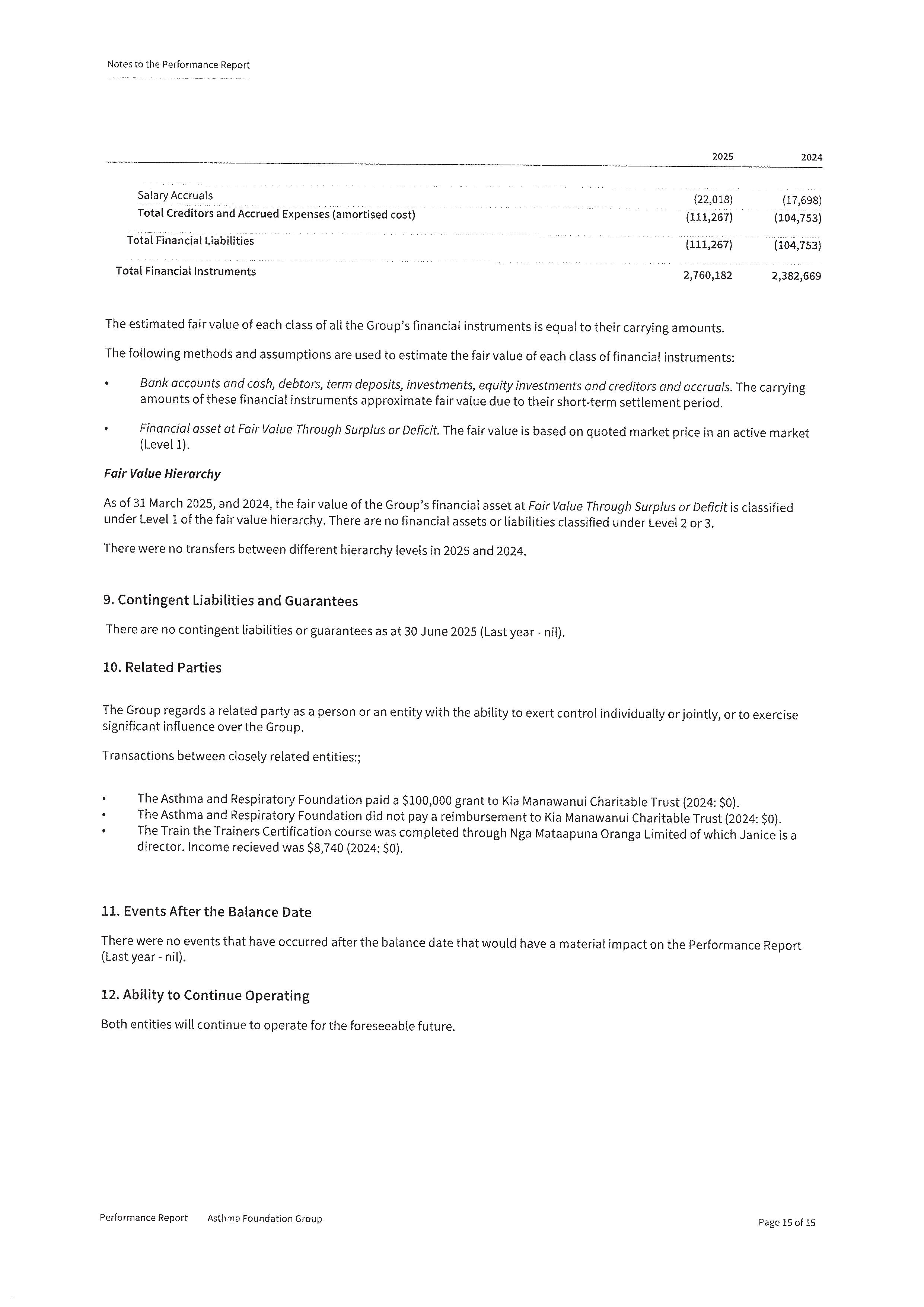

Directory
Patron
Her Excellency The Rt Hon Dame Cindy Kiro
Board
John Knight, President
Janice Kuka
Ruth Gardener
Cheryl Davies
Philip Aldridge
Jeannine Stairmand
Taumata O Te Rā
Medical Director
Professor Bob Hancox
Chief Cultural Advisor – Māori
Sir John Clarke, KNZM, CNZM
Scientific Advisory Board
Professor Bob Hancox (chair)
Dr James Fingleton
Dr Stuart Jones
Dr David McNamara
Professor Richard Beasley
Professor Lutz Beckert
Ms Betty Poot
Mrs Zoe Manderson
Mrs Nicola Corna
Dr Adrien Trenholme
Dr Lucy Telfar-Barnard
Dr Amy Chan
Ms Joanna Turner
Ms Letitia Harding
Registered Charity
CC53035
Staff
Chief Executive: Letitia Harding
Deputy Chief Executive & Research and Education Manager: Joanna Turner
PR and Comms Marketing Manager: Chloe Bradwell
Marketing and Communications Advisor: Sam Treseder
Grants and Fundraising Executive: Michaela Tahere
Digital Content & Marketing Advisor: Jared McOnie
Corporate Sponsorship and Engagement Advisor: Paul Aschenberger
Māori Community Liaison & Youth Vaping
Educator: Sharon Pihema
Community Liaison & Youth Vaping Educator: Pene Joyce
Individual Giving Fundraising Executive & Office Administrator: Christina Goss
Solicitors
Tuia Group
Accountants
Deloitte
Auditors
Moore Markhams
Contact details
85 The Terrace, Level 2, Wellington Central, Wellington, 6011 PO Box 1459, Wellington 6140 04 499 4592
asthmafoundation.org.nz
Facebook.com/asthmaandrespiratoryfoundation Instagram.com/asthmaandrespiratoryfoundation Linkedin.com/company/arfnz/

